-
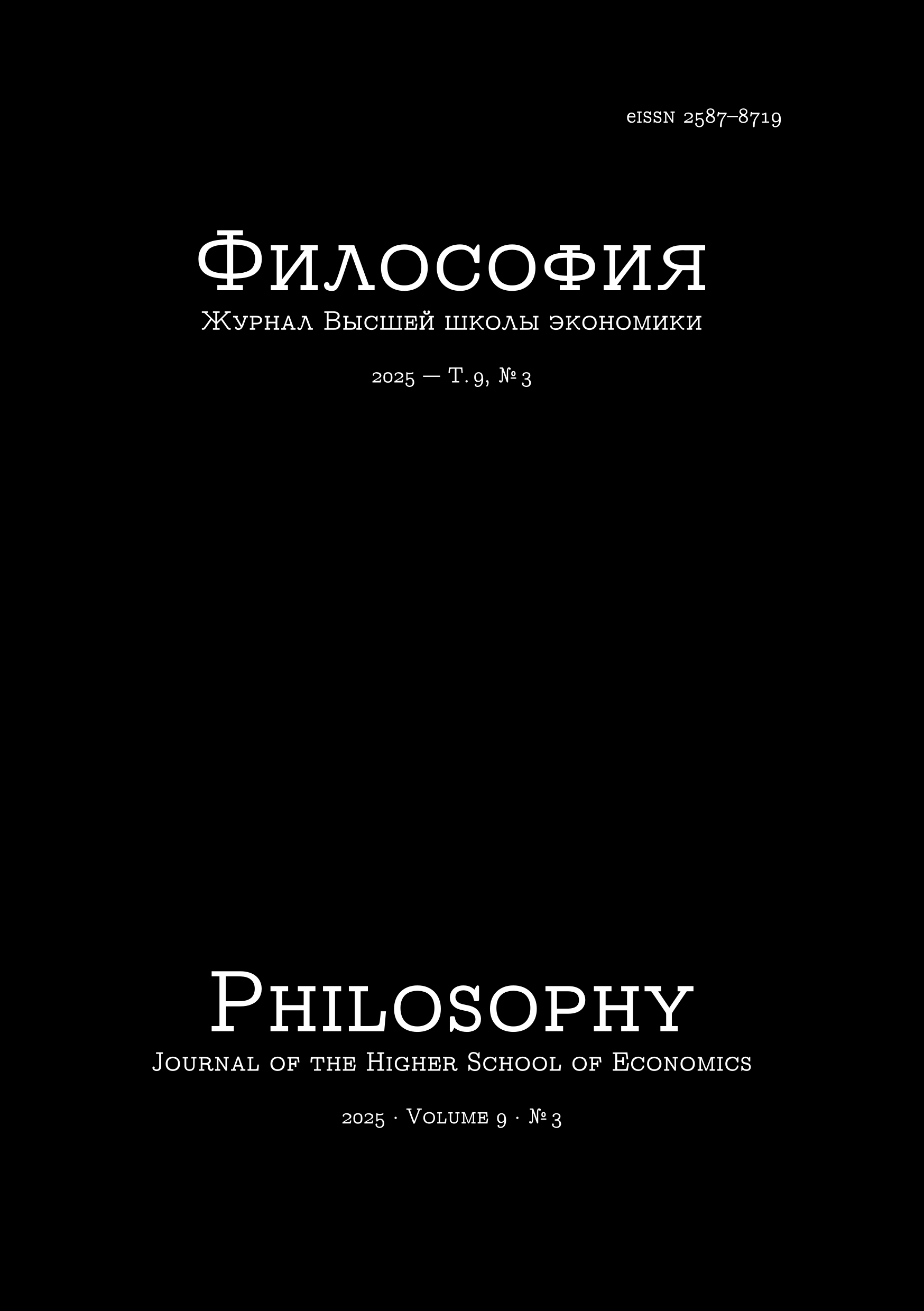 Contemporary Philosophy
Vol 9 No 3 (2025)
Contemporary Philosophy
Vol 9 No 3 (2025)Dear colleagues!
We are pleased to present the 3rd issue of the 9th volume of “Philosophy. Journal of the Higher School of Economics”. This issue features articles on logic, history of philosophy, and various fields of practical philosophy — not only (and perhaps not primarily) on philosophy of law and political philosophy, as was the case in the previous issue, but also on ethics, aesthetics, philosophy of science, philosophy of media, etc.
The issue opens with the “Logic and Philosophy” section. Zinaida Sokuler discusses the debates surrounding one of the most talked-about contemporary interpretations of the “Tractatus Logico-Philosophicus”. Antonina Kon’kova and Vladimir Markin attempt to explicate the propositions of the imaginary (non-Aristotelian) logic of Nikolai Vasiliev (1880–1940). I would like to emphasize that scholarly interest in the legacy of a figure like Vasiliev extends far beyond the confines of logic itself. Therefore, this text may be of interest to a broad philosophical audience. David Khizanishvili applies a cognitive approach to rational belief revision. The section concludes with an article by Georgy Filatov and Maksim Evstigneev, dedicated to the concept of philosophical analysis in the legacy of Ludwig Wittgenstein, Gilbert Ryle, and Peter Frederick Strawson.
The “History of Philosophy” section features two studies. Dmitry Fedchuk compares the approaches of Moses Maimonides and Thomas Aquinas to the theoretical apprehension of God by the intellect. Anna Platanova writes about how Nikolai Berdyaev, by critiquing Martin Heidegger, managed to formulate his own philosophy as existential. This article may contribute to discussions about whether we can consider Heidegger a representative of existential philosophy.
The “Practical Philosophy” section presents five studies. The section begins with an ambitious and, in a good sense, polemical article by Sophia Tikhonova and Lada Shipovalova. The authors postulate that digital technologies have reshaped social institutions and structures of knowledge production and distribution. As a result, in the authors’ view, mediality becomes a key characteristic of the current stage of science development. And since science performs the communicative functions of media, Sophia Tikhonova and Lada Shipovalova propose the new term “mediascience”. You can read about what it is in the article. I believe our readers will enjoy debating the given position. Elena Timoshina returns to the topic of the philosophy of law, which began in the 2nd issue of the 9th volume. The author examines one version of the rehabilitation of the common good, namely “common good constitutionalism”, and the debate surrounding this project. Mikhail Stepanov attempts to tackle a rather complex issue — he aims to contextualize contemporary republican theory. The complexity lies in the fact that republicanism as a contemporary theory is highly contradictory, and this is exactly what the author is grappling with. Ivan Snetkov explores the problem of the need to integrate moral values into the architecture of artificial intelligence systems. Finally, Maiia-Sofiia Zhumatina analyzes the paintings of Paul Cézanne, using Maurice Merleau-Ponty’s phenomenological teaching as the methodological framework.
In the “Publications and Translations” section, we continue publishing the translation of George Dalgarno’s treatise “The Art of Signs”. The publication of the fifth and sixth chapters of the treatise is preceded by an introductory note by Natalia Osminskaya, the editor of the translation. I am particularly pleased to note that this translation of the treatise has been carried out for several years now as part of a student-led initiative project. The translators and commentators for the fifth and sixth chapters were Emil Rakhmankulov, Renata Idrisova, and Ilya Onegin. In the “Reflections on a Book” section, Maria Marey reflects on the Russian translation (2025) of Carl Schmitt’s “The Tyranny of Values”. The “Academic Life” section provides a detailed overview of the already Sixth Bibikhin Readings, held at the Faculty of Humanities of the HSE University on June 27–28, 2025.
Thank you, dear readers, for your interest in the journal.
Alexander Pavlov
-
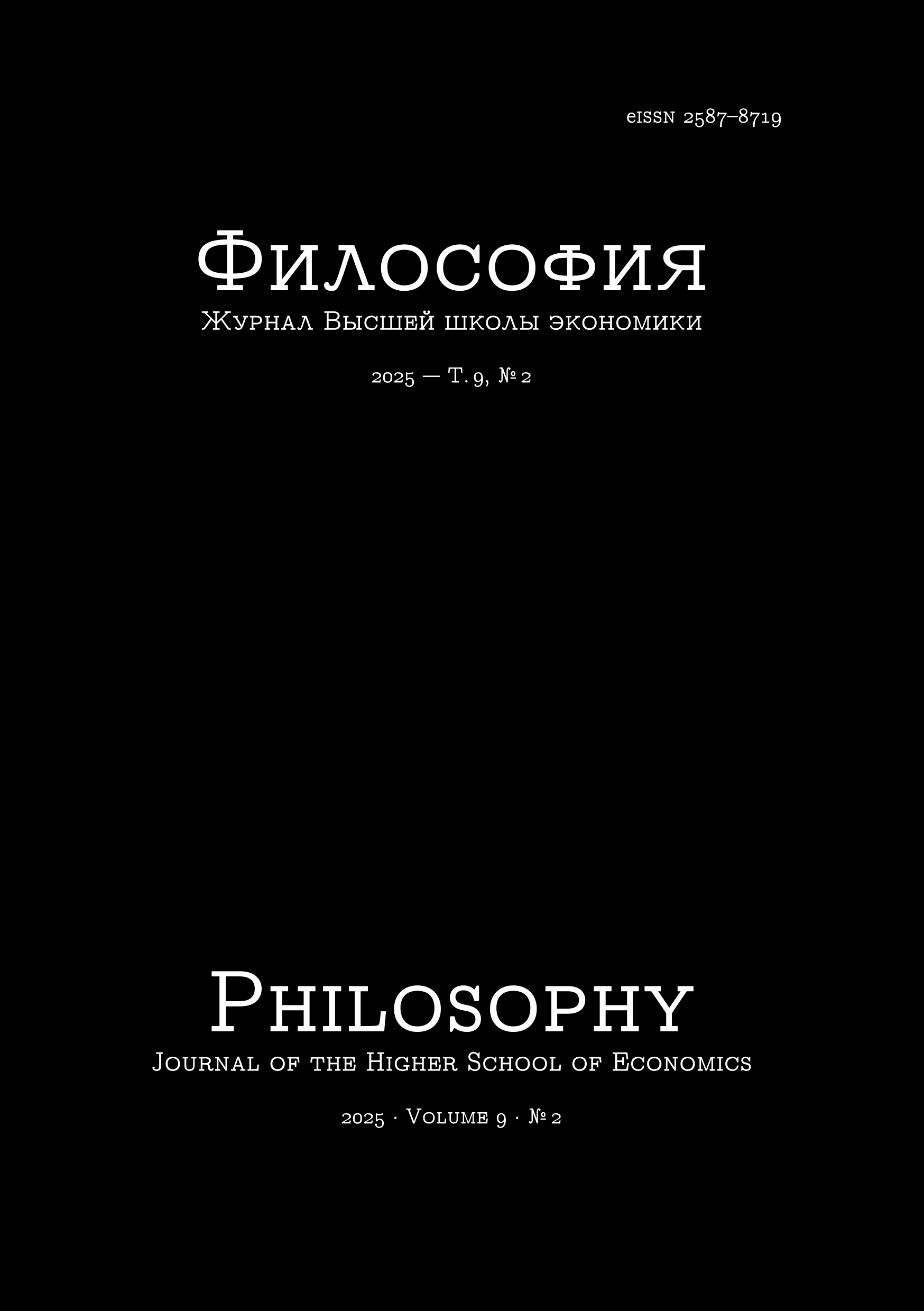 Contemporary Philosophy
Vol 9 No 2 (2025)
Contemporary Philosophy
Vol 9 No 2 (2025)Dear colleagues!
We are pleased to present the 2nd issue of the 9th volume of “Philosophy. The Journal of the Higher School of Economics”.
This issue is dedicated to various aspects of practical philosophy — a field of philosophical inquiry that, for various reasons, has become one of the journal’s central focuses. All the contributions in the three main sections engage with political and legal philosophy: “History of Political Thought”, “Political Philosophy of Slavophilism”, and “Problems in the Philosophy of Law”.
The first section, “History of Political Thought”, features two studies. Olga Togoeva examines Jean Petit’s treatise “Justification of the Duke of Burgundy” (1408), a seminal source that first formulated the theory of crimen laesae majestatis. Anna Seregina analyzes English political pamphlets from the second half of the 16th century, focusing on the concepts and metaphors borrowed from classical republican tradition. The author highlights how pamphleteers discussed female rule and the objectives they pursued.
The “Political Philosophy of Slavophilism” section comprises four contributions. Arseniy Romanenko seeks to explicate the concept of “People” in Slavophile texts from the 1840s–1880s. Aleksandr Kotov explores the reception of Slavophilism in the political and literary newspaper “Novoye Vremya” during the 1880s. Andrey Teslya examines Vasily Zenkovsky’s portrayal of the Slavophiles in his historical-philosophical works. Larisa Arzhakova compares two Polish scholars’ interpretations of Slavophile teachings — Marian Zdziechowski (1861–1938) and Andrzej Walicki (1930–2020).
The “Problems in the Philosophy of Law” section includes five articles. Arseny Kraevsky investigates the concept of public authority — including its social dimensions — in legal philosophy. Anton Mikhailov discusses the significance, structure, and methodological foundations of legal dogmatics in the continental legal tradition, with particular attention to how philosophical worldviews influenced the development of public law dogmatics. Dmitry Poldnikov traces the doctrinal origins and key milestones in the long process of recognizing legal entities as subjects of law across global legal systems. Nikolai Kuznetsov explores how madhhab (legal schools) emerged as one of the most important institutions and concepts in Islamic law. Vladimir Bashkov examines the extra-legal foundations of Hans Kelsen’s philosophy of law.
In our traditional “Archive of Philosophical Thought” section, Ivan Lupandin and Grigoriy Konson have translated and annotated (also authoring the preface) an excerpt from “Dagger of Faith” by the Catalan philosopher and theologian Ramon Martí (Raymundus Martinus). The “Philosophical Criticism” section features four reviews: Fyodor Gayda reflects on Konstantin Dushenko’s book on Russophobia (2024); Artem Bychkov reviews the collection “Diseases of the Head: Essays on the Horrors of Speculative Philosophy” (ed. Matt Rosen, 2020); Konstantin Mal'tsev evaluates the second volume (of two published — a third one is expected this year) of Sergey Nikolsky’s work on the Soviet era (2023). Additionally, my own review is included, covering a 2025 book on James Cameron’s “Aliens” from the “Constellations” series on science fiction cinema.
In Memoriam. This year, the Faculty of Philosophy of Lomonosov Moscow State University suffered irreparable losses. Several brilliant scholars and teachers passed away: in May, our journal’s contributor Elena Kosilova, and in June, Karen Momdzhyan, Head of the Department of Social Philosophy and Philosophy of History, and Mikhail Maslin, Head of the Department of the History of Russian Philosophy. Tributes were written by those close to them: Zinaida Sokuler for Elena Kosilova, Aleksandr Antonovsky for Karen Momdzhyan, and Boris Mezhuyev for Mikhail Maslin.
The editorial board of “Philosophy. The Journal of the Higher School of Economics” and the faculty of the School of Philosophy and Cultural Studies at the HSE University mourn their passing and extend deepest condolences to the families, friends, and colleagues of Elena Vladimirovna, Karen Khachikovich, and Mikhail Alexandrovich.
Alexander Pavlov
-
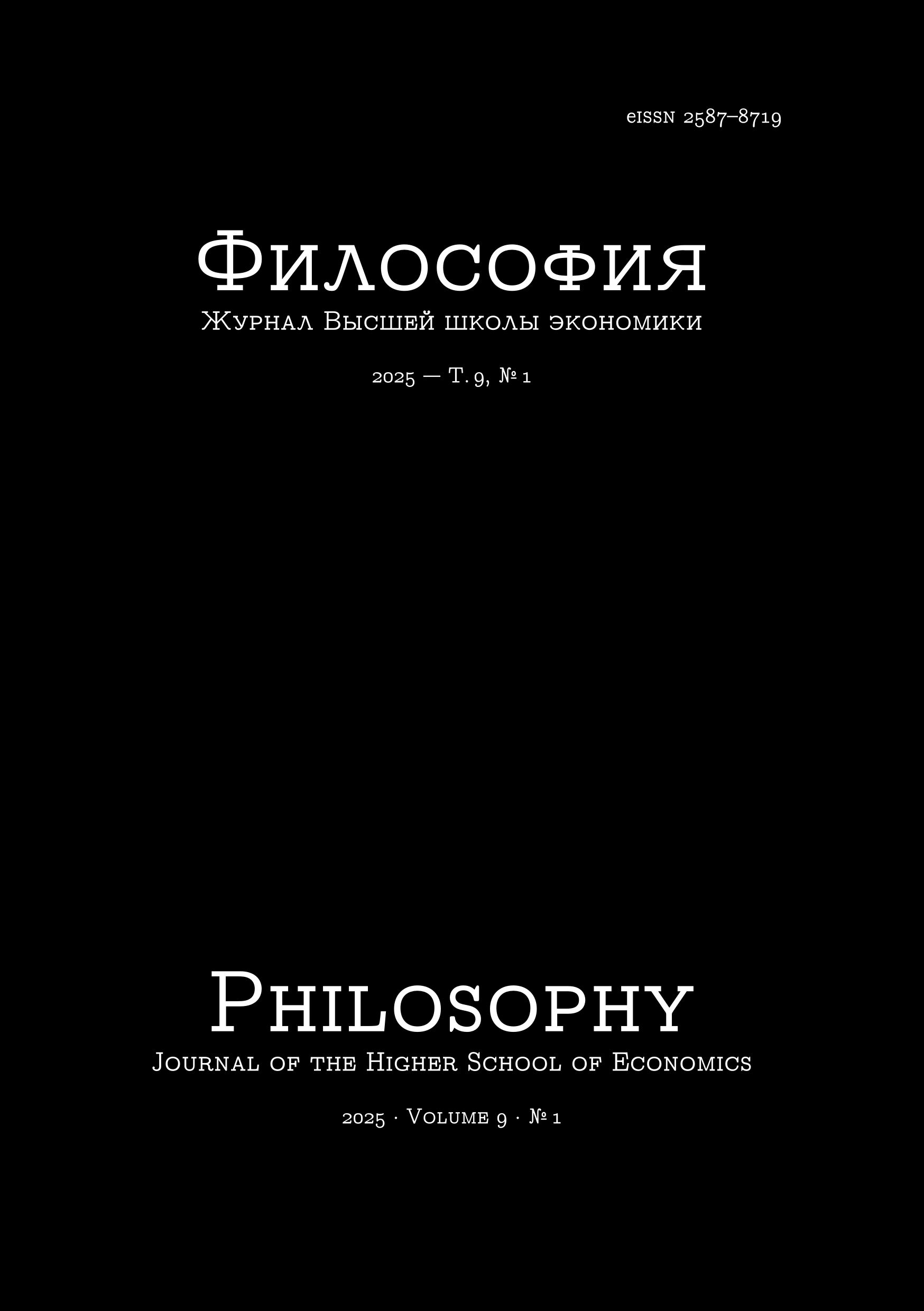 Contemporary Philosophy
Vol 9 No 1 (2025)
Contemporary Philosophy
Vol 9 No 1 (2025)Dear readers, authors, and everyone who follows Philosophy. The Journal of the Higher School of Economics!
Last year, our publication underwent some minor — and, in the grand scheme of things, insignificant — changes in its editorial team and board. Vladimir Porus, who had led the journal since its founding, stepped down as Editor-in-Chief, and I had the honor of succeeding him. The transition is not so drastic because professor Porus remains an active member of the editorial board, while I have been a dedicated participant since the very beginning. In short, as one social theorist aptly put it, everything has changed, yet nothing has changed.
Over the years, Philosophy. The Journal of the Higher School of Economics has become an important platform for discussing key issues in the history of Russian and foreign philosophy, logic and ethics, philosophy of science and technology, political and social philosophy, and more. Equally significant is the journal’s commitment to publishing works in historical studies. The "historical face" of our publication has gained recognition — evidenced by its high standing in scientometric databases. The editorial team takes pride in the fact that the journal thrives not only as a philosophical publication but also as a historical one. Our journal unites researchers working in different academic traditions and contributes to the development of philosophical thought both in Russia and beyond.
We are delighted that the journal has become a meeting point for diverse research traditions. It features not only established scholars but also young researchers (we always welcome submissions from graduate students), whose ideas and approaches help reinterpret the legacy of the past and illuminate new paths for philosophical inquiry. In recent years, our journal has strengthened its scientometric standing, expanded its pool of authors, and gained visibility in the international academic community.
None of these achievements would have been possible without the dedicated work of the editorial team, the active members of the editorial board, and — most importantly — our esteemed peer reviewers, whose contributions we deeply value. Thanks to their professionalism, rigorous selection process, and thorough peer review, we maintain the high quality of our publications — original research and translations alike — ensuring their relevance to the philosophical community. We are grateful to everyone who contributes to the journal’s growth.
Ahead of us lie new challenges and opportunities. We hope that the materials we publish will continue to inspire authors and readers, opening new horizons of knowledge.
Thank you for being with us!
Alexander Pavlov
-
 Actual Problems of Ortega y Gasset's Philosophy
Vol 8 No 4 (2024)
Actual Problems of Ortega y Gasset's Philosophy
Vol 8 No 4 (2024)José Ortega y Gasset (Madrid, 1883–1955) is the most prominent Spanish philosopher of the 20th century. He is also considered one of the most original European thinkers of the past century. His ideas and some of his solutions were pivotal in shaping the global philosophical landscape, and his influence was notable both in Europe and the United States (where he was embraced by various philosophical and sociological movements), as well as in Latin America, where his doctrine reached through the numerous students exiled after the Spanish Civil War.
We are now marking the centenary of the peak years of his thought: in 1922, España invertebrada was published; in 1923, El tema de nuestro tiempo; in 1925, La deshumanización del arte was released; and between 1927 and 1930, La rebelión de las masas appeared in articles and as a book. This anniversary seemed like a perfect occasion to present this special issue on his philosophy one hundred years later: Which of his theories remain relevant today? To what extent have his work and that of his disciples influenced the shaping of our present? What can we expect from Ortega studies in the coming years?
The editors of this special issue would like to thank Filosofiya. Zhurnal Vysshey Shkoly Ekonomiki (Philosophy. Journal of the Higher School of Economics) for providing the opportunity to present the work of Ortega y Gasset to the general public and, particularly, to the Russian philosophical academy. We are confident that the articles in this volume will be of interest and foster a fruitful dialogue. We also wish to express our sincere gratitude to all those who have generously agreed to contribute to this special issue by submitting articles or book reviews that demonstrate the relevance and productivity of this significant field of study. We sincerely hope that their contributions, whose quality and scholarship we attest to, will offer novel perspectives and facilitate further research on Ortega around the world.
Rodolfo Gutiérrez Simón (Complutense University of Madrid)
Roman Ustiantsev (Complutense University of Madrid, Spanish National Research Council)
-
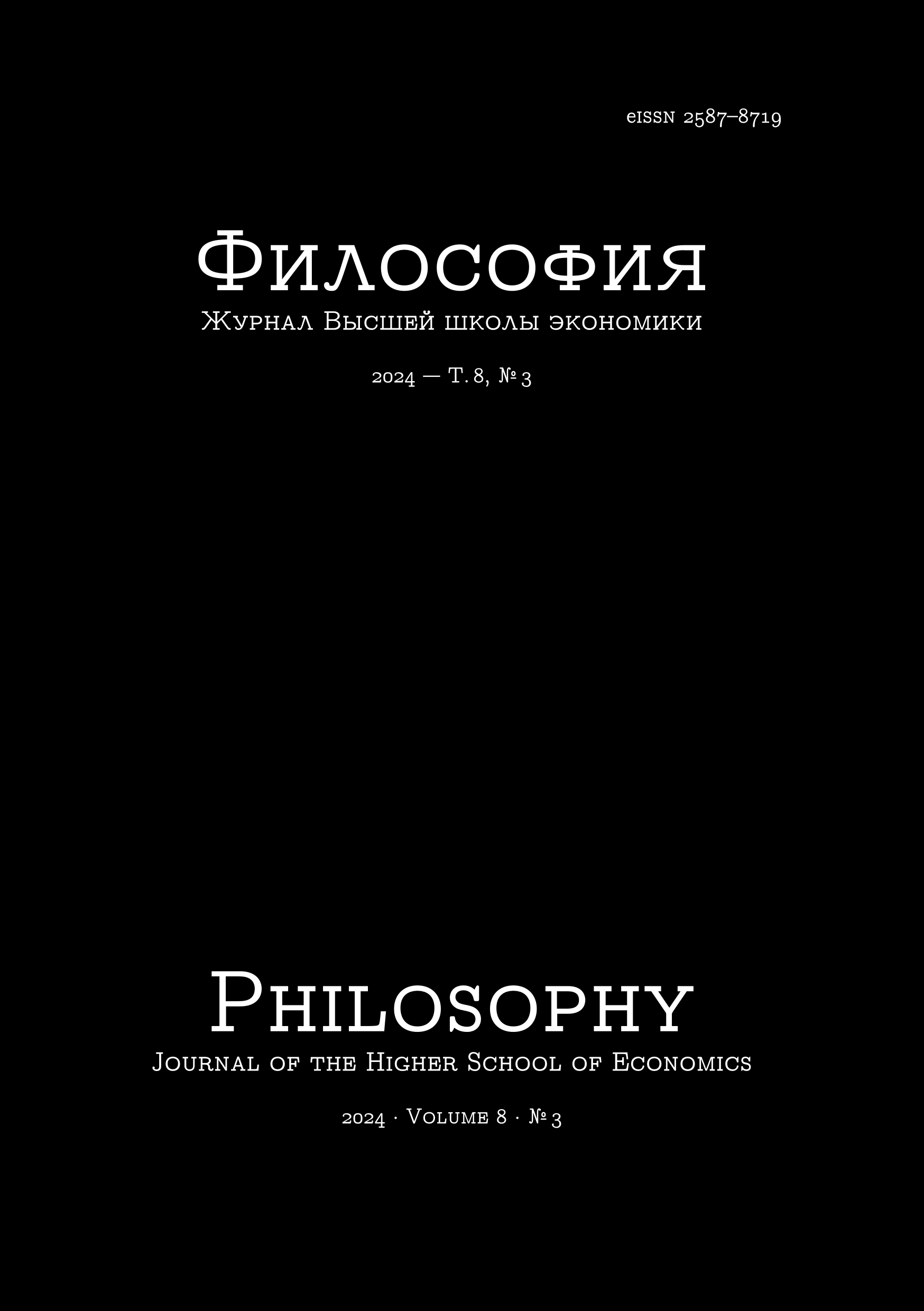 Contemporary Philosophy
Vol 8 No 3 (2024)
Contemporary Philosophy
Vol 8 No 3 (2024)We present the third issue of our journal for the current year. It contains studies that mainly address historical and philosophical topics and socio-political philosophy. The chronology of the articles included in the issue covers the period from classical antiquity to the present day and the geography - from Hellas to the Turkic steppes.
The issue opens with an article by Nikola Lečić, dedicated to the ancient visual philosopheme of embracing disorder by order. The author focuses on the worldview of the early Pythagoreans and Platonists, in particular, the concept of the dodecahedron as a figure capable of embracing the whole. Paired with it is the study by Olga Alieva, who considers the possibility of using the stylometric method to determine the authorship of dialogues in the Platonic corpus. The transition from ancient to medieval themes is presented by Oleg Aurov's article, which examines the existence of the concept of palatium in late Roman and early medieval Spanish texts and continues with an English-language study by Juan Sota, which focuses on the role of the cult of the Virgin Mary in the Kingdom of Castile during the reign of Alfonso X the Wise.
Konstantin Erusalimsky analyzes the ethical and political views of Prince Andrei Kurbsky in his study, proposing to consider them, first of all, as a language problem. Of extreme interest in this article is the analysis of Kurbsky's attempts to bring Orthodox education closer to Catholic scholarship and the ethical and political ideals of the ancient world. Gaziz Telebaev and two co-authors, Altaybaeva Ayaulym and Bexeit Asylzat, draw the reader's attention to the use of political concepts in the classical Turkic picture of the world, using a corpus of texts from the 8th-13th centuries for analysis.
The block of studies continues with two pairs of articles, each of which is of considerable interest to readers. Thus, Ilya Pavlov's investigation turns to the analysis of the methodology of the Cambridge School researchers and suggests supplementing it with several tools developed by other authors of a wide range, from Michel Foucault to Hermann Lubbe and Evert van der Zweerde. Larisa Zhgileva's article is a detailed analytical review of the utopian discourse in French social and philosophical literature of the 20s of our century. The articles by Daria Shakhova and Mikhail Voloshin are devoted, respectively, to the problems of phenomenology in the research of Vladimir Bibikhin and the epistemology of computer simulations.
Evgeny Maslanov's article opens a fascinating discussion on the problem of political subjectivity of modern science. Vladimir Porus, Valentin Bazhanov, Liana Tukhvatullina, Svetlana Shibarshina and Evgeny Zharkov participated in the debate. The block of reviews and literary overviews in this issue includes Oleg Aurov's reflections on Pavel Lukin's book and Sumbel Zainullina's review of Matthieu Queloz's book. The issue ends with a review of the Fifth Bibikhin Readings, compiled by Daniil Vishnyakov and Nikolai Sloboda.
-
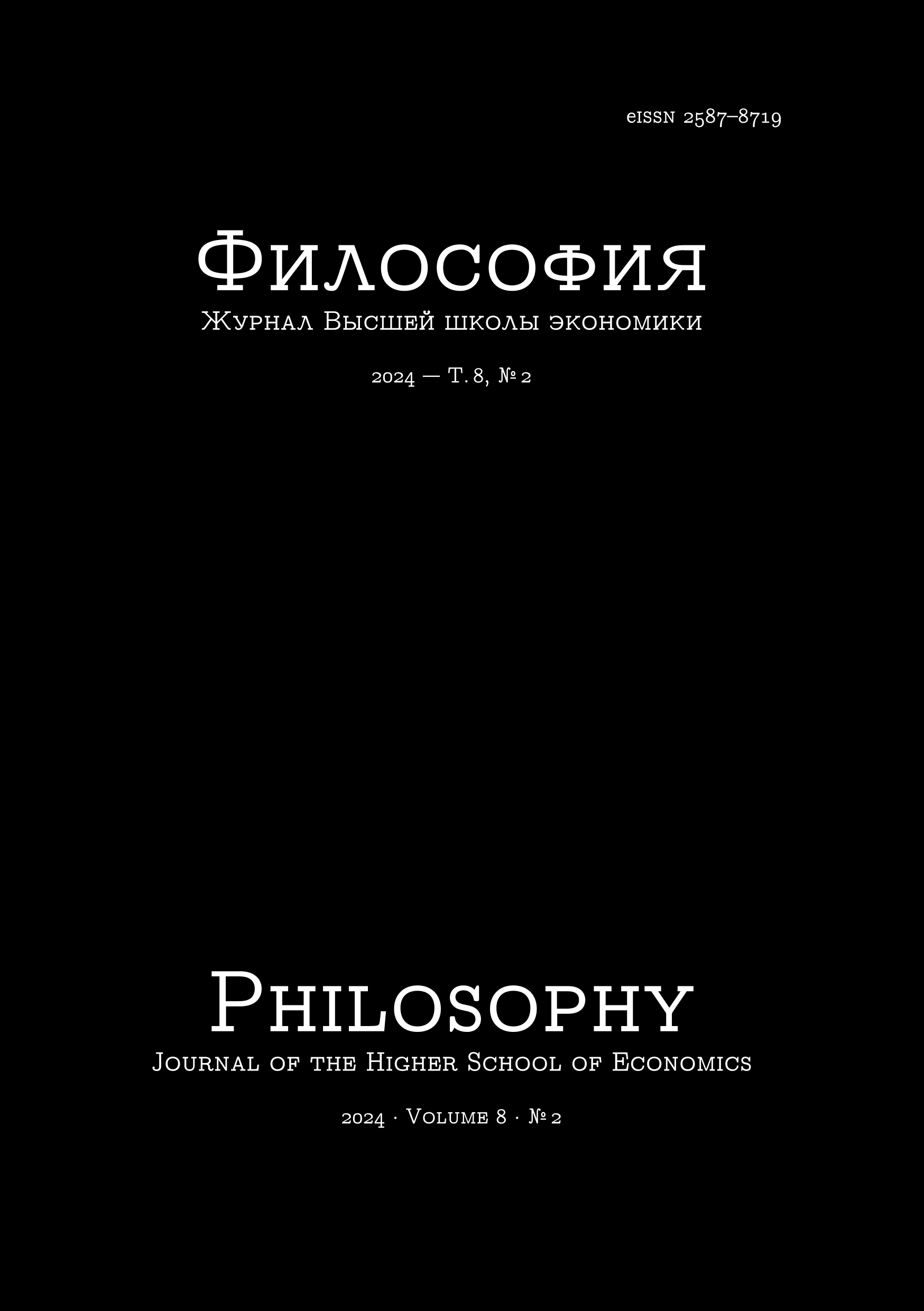 Contemporary Philosophy
Vol 8 No 2 (2024)
Contemporary Philosophy
Vol 8 No 2 (2024)We are pleased to present the second issue of the journal “Philosophy” for 2024. This is already the eighth year of our journal’s existence. Over the past years, we have achieved quite a lot. The journal is indexed in several large databases, downloaded and read, and, importantly, people write to it. We, as always, adhere to the presumption of open science, and accept, with equal interest, articles from venerable scientists and young authors alike. We also maintain thematic openness: since we decided to move from thematic issues to a section-based structure, each new issue delights with its diversity.
This issue opens with a small section devoted to the history of thought, which includes four texts. Maria Ponomareva's article is dedicated to legal and theological discourse about power at the court of King Charles V of France. The focus is on two figures: the famous translator of Aristotle, Nicolas Oresme, and the anonymous author-compiler of the treatise known as “The Gardener’s Dream.” The publication continues with articles based on Russian material. Andrey Teslya examines the “images of the future” among Russian socialist intellectuals over half a century, from the 1840s to the 1890s. He stresses that early Russian radicalism was characterized by an emphasis on the direct, personally realized implementation of new practices as a consequence of the need to bridge the gap between broad general ideas, the impossibility of social action and the prospects for the near future associated with one’s participation. Sergey Sergeev turns to the image of homo novus, derived from the works of Soviet scientific and social fiction, from Ivan Efremov to A. and B. Strugatsky. The section ends with a programmatic article by Victoria Lysenko, in which she presents her concept of Indian philosophy, which sums up the author’s Indological research over the past forty-five years.
Issue Number two continues with a section that combines articles on logic, phenomenology and social anthropology. Aleksandr Belikov considers in his study the three-valued implication proposed by Robert Farrell. He emphasizes that, firstly, Farrell’s implication has all the properties sufficient to classify it as a connective implication, and, secondly, being similar in some of its properties to conjunction, it can be used to formally model some of the features of understanding conditional statements inherent in a person in the early stages of the development of their cognitive abilities. Tatyana Ryabushkina's article is devoted to the study of an approach for researching subjectivity as a condition for the possibility of conscious experience, which does not allow, on the one hand, the objectification of the subject of knowledge, considering it as a thing among other things of the conscious world, and on the other, its formalization and elimination. Ekaterina Melnikova's research is dedicated to the doctrine of meaning and meaning in the philosophy of Husserl, Heidegger and Lask. The author shows that Husserl, Heidegger and Lask develop similar intuitions in their works, which make the study of the phenomenon of meaning one of the central elements of their philosophical teachings. Finally, Olga Ivashchuk stresses two methodological figures, the core of which is a logical contradiction: the double-bind construction introduced by G. Bateson, which is aimed at eliminating the contradiction using Russell’s theory of types, and the Hegelian logical form of contradiction, work with which presupposes a culture of movement in contradictions and the ability to resolve them.
The last part of the “Research” section is formed by a small Varia section, which includes four articles. Mikhail Adamov considers the concept of “epistemic responsibility” as the ability of a subject to perceive themself as an agent of the cognitive process, trusting their mental capacities, and independently developing the rules of achievement and criteria for the success of their cognitive activity. Maxim Miroshnichenko discusses the concept of the virtual in its connection with ethics and, using the example of immunology, shows how virtuality determines the self and individuality of humanity and other forms of life. Boris Pozdnyakov and Evgeny Nenadyshchuk turn to the analysis of the philosophical concepts of Gilles Deleuze and Bernard Stiegler.
The issue continues with the traditional section “Translations and Critical Editions”, which this time presents two materials: the first part of George Dalgarno’s treatise “The Art of Signs” and an article by T.G. Huxley "Agnosticism". Both translations are accompanied by two extensive researches compiled by Natalia Osminskaya, Emil Rakhmankulov and Daniil Lavrischev.
The issue ends with a large-scale review written by Alexander Pavlov on the recently published book by Alissa Burger.
A.M.
-
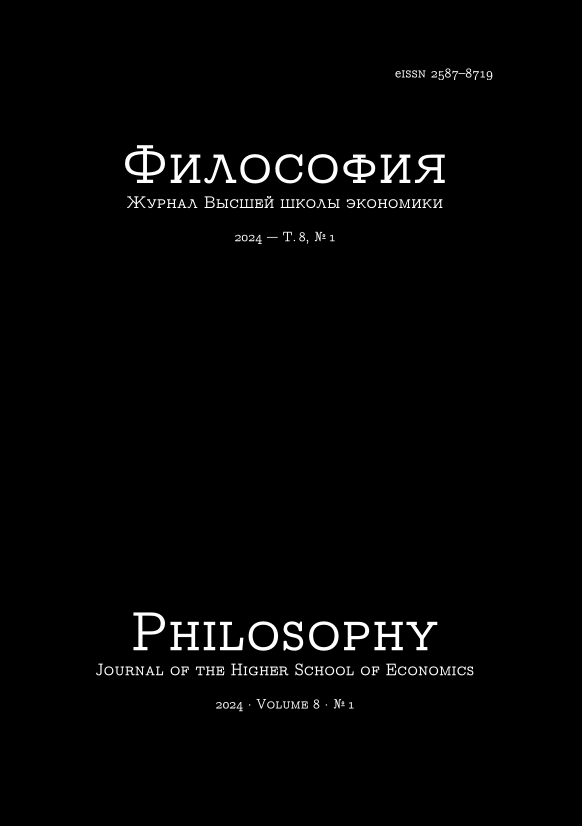 Logic and Translations, Art and Language
Vol 8 No 1 (2024)
Logic and Translations, Art and Language
Vol 8 No 1 (2024)Successful in its propaedeutical role, logic has remained an inherent part of university education for hundreds of years. Today, however, it is less and less common in academic programs. In its place, courses on Academic Writing, Theory of Argumentation, Decision Making and Critical Thinking are often implemented into the curriculum. Sometimes the place once occupied by logic remains vacant. In the cycle of small articles titled “Logic at University: Between Maths, Argumentation and Cognitive Sciences” which open the first issue of “Philosophy. Journal of the Higher School of Economics” in 2024, their authors reflect on the situation that logic and logics education have come to be in as well as various ways of changing it.
Alexei Krouglov invites us back into the 18th century, to the time of the founding of universities in Russia. He compares the meaning logic had in those times to that of today. This contrast raises a number of questions: is logic (in its wider connotation) able to continue its propaedeutical role, how could introductory logics courses for non-professionals be beneficial, and how should logic education, enhanced by modern mathematical methods, be constructed in philosophical faculties, so that it does not “put students off from a deeper investigation of the subject”.
Elena Dragalina-Chernaya and Angelina Bobrova seek answers to some of the above questions in their articles. E.G. Dragalina-Chernaya views logic as a formal philosophy, which has lost the function of neutral arbitrator in the argument, but retained its role as conceptual designer in theoretical research. The diversity of non-classical logics has led modern logic to pluralism, and, as a result, to the rejection of attempts to construct a single true and universal theory of correct reasoning. However, staying true to the ideal of formality, the logical art of conceptual engineering remains, in the view of the author, irreplaceable in an objective scientific investigation, which aims to avoid the extremities of dogmatism and relativism. A.S. Bobrova focuses on short interfaculty courses and takes the reader back to the status of practical logic, developed in the 17-18th centuries and almost nonexistent today. The author displays the advantages of practical logics, dissecting them through the prism of diversity of critical thinking courses. In the Russian educational system, those that stand out contain elements of practical logic, with its clear tasks and time-tested methods. Perhaps this implies that the tradition of teaching practical logic, once so common in the universities of Imperial Russia, has not fully lost its positions.
Through referring to personal experience in teaching different disciplines of the logico-methodological cycle, Galina Sorina and Elena Lisanyuk show the effectiveness of applying logic skill and understanding to solving tasks related to text analysis, collaborations within expert communities, elimination of interpretational and axiological lacunae, that could lead to complications in scientific and pedagogical practices, as well as in legislation and law enforcement. Drawing upon her author’s method of expert text analysis, G.V. Sorina asserts the importance of logics technologies, especially in working with terminology, for evaluating any text regardless of its professional sphere. E.N. Lisanyuk demonstrates the value of the study of logic through the elimination of a legal collision in the “Women and the Jury” case.
The cycle concludes in Valentin Bazhanov’s article, in which evidence is provided for the author’s hypothesis on the mutual dependence between logic and logic education on one hand, and ideological impact on society, not necessarily pro-government, on the other. The researcher uses cognitive science data to back up his ideas and poses the question: could the expansion of logics education help people overcome narrow-mindedness and conservatism by making them more open to seeking new and more rational solutions?
We invite our readers to also reflect upon this question. Our hope is that these articles on teaching logics, an unusual subject known to many, yet still brimming with theoretical and pedagogical problems and even paradoxes, may elicit an eager response in the readers of our journal: one might discover new facts, find food for thought or even be inspired into public discussions.
E.G. Dragalina-Chernaya, A.S. Bobrova
* * *
The current issue further comprises articles unrelated to logic and devoted to other areas of philosophical (or humanitarian) knowledge. The first of these is a piece by Oxana Koval and Ekaterina Kriukova, in which the phenomenon of poetical thinking in Walter Benjamin’s philosophy, as well as in that of his heir in the matter, Hannah Arendt, is addressed. In the history of the former’s posthumous fame, Hannah Arendt has played the role of a medium of sorts – owing not only to the fact that she took it upon herself to publish his works and promote his ideas among the American public, but also because in her own writing she often turned to and developed in her own way the philosophical narratives that had worried him. Igor’ Devaykin’s article is devoted to the problems of factiality ontology by Quentin Meillassoux. The latter is known as one of the foremost fighters against correlationism in modern philosophy. Correlationism is understood by Meillassoux as the amalgamation of post-Kantian conceptions of philosophy, which reject the possibility of discovering the reality independent from thought and suggest focusing on the connection (the correlation) between thought and reality. The author proposes agreeing with Meillassoux in that the above method of philosophizing should be fought, since it is not reflective enough of its own presuppositions and greatly narrows down the field of scientific work. Correlationism of this kind can only be overcome by pointing out factiality, understood as the absolute absence of proof of any kind, including correlationism itself.
In the article by Samson Liberman and Adelya Khayaleeva, the problem of translation as the main language of the modern world is brought to the forefront. Drawing on the work of D. Bachmann-Medik, who formulated the conception of the “translation turn”, the authors suggest reflecting on the move from the paradigm of globalization to that of glocalization. The distinctive feature of “glocal capital” is seen by the authors as the emergence of platforms and relevant systems of production and consumption. The main outcome of the article is the formulation of the contradiction between the emancipatory potential of translation practices and the totalizing implementation of this principle in modern capitalism. The researchers make an analogy to M. Foucault’s discourse concept: if, according to the latter, an intellectual’s mission used to lie in discovering the domination of language, then today it may well reside in uncovering the ascendancy of translation. Alexander Marey’s article, devoted to the analysis of the image of an ideal ruler through the mirror of “History of Spain” by Alfonso X The Wise is, in its own way, a continuation of the previous research, and proposes to reflect upon an interesting case of translation as a tool which constructs ethical political reality. The fact that the investigation deals with material from the medieval period allows to peruse the incident without emotional involvement.
The “Studies” segment is concluded by articles from Harlampy Emeretli and Oleg Domanov. In the former the author turns to the problem of comprehending the definition of suicide. He suggests conceptualizing the phenomenon in the context of polemics with the modern analytical philosophy of suicide, which mainly focuses on clarifying the theoretical grounds of the phenomenon. In particular, unobvious terminology such as intention, coercion, instrumentality and death are subjected to analysis. The article defies the impossibility of constructing an unambiguous definition of suicide strictly separated from other types of death, and the characterization of the phenomenon is of a descriptive character, devoid of judgement in terms of morality or immorality of the act, its rationality or justifiability. Oleg Domanov turns to problems of features and types in type-theoretical natural language semantics. Features and types make up two possible ways of classifying phenomena related to the formalization of grammar and the natural language semantics. Features are commonly used in linguistics-oriented theories, however they do not align well with theory-type semantics due to the notion of subtype to which they lead. The article suggests a way of reconciling the two approaches through defining types via feature-based classification. The author demonstrates this method through formalizing a small fragment of English text. A general formal theory of syntax and semantics for this language is developed and is of separate interest. Formalization is carried out in the Agda language.
In the “Translations and Critical Editions” section we present the Russian translation of the response of the Anglican priest Jonas Proast to the English edition of John Locke’s “Letter on Toleration”, carried out by Aleksander Mel’nikov, together with his introductory investigation. Proast’s texts have not previously been translated to Russian, despite their impact both on Locke’s later political texts and on the modern interpretation of Lockean justification of toleration being widely recognized and discussed in many secondary sources.
The issue concludes in the traditional block of philosophical criticism, which currently comprises Maiia-Sofiia Zhumatina’s review of the book on temporality, chronology and anachrony in modern art history, Konstantin Antonov’s reflections on Olga Zhukova’s monograph and Gleb Yengovatov’s critique of John Gray’s book “The New Leviathans”.
A.M.
-
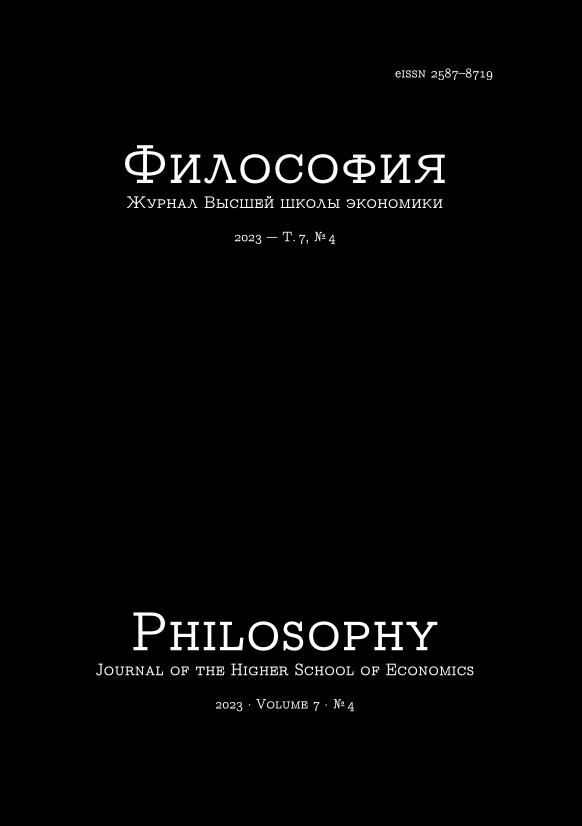 Contemporary Philosophy
Vol 7 No 4 (2023)
Contemporary Philosophy
Vol 7 No 4 (2023)In this final issue of the 2023 volume, we turn our attention to the timely and important topic of feminist philosophy. The term “feminist” encompasses a diverse range of perspectives and approaches, making it crucial to provide a brief explanation of how it is used in this issue. This issue's articles engage with both the philosophical perspectives of women authors and the philosophical inquiries into the experiences and challenges faced by women in society. Hence, the issue opens with an article by Sofia Porfiryeva and Mariia Stenina, which utilizes critical phenomenology to analyze and compare the ethical approaches to nonviolence proposed by Judith Butler and Sara Ahmed. In the next article, Anastasiya Adamova defines the problem of the subject in feminist discourse within the concept of motherhood. The issue then proceeds to explore the works of female philosophers who were once prominent but have since become marginalized in the field, with several articles dedicated to highlighting and analyzing their contributions. The first of these is a study by Yekaterina Kosholap that examines the role of women within the Cadet Party, while the second is an article by Lyubov Bogodelnikova that sheds light on the contributions of M.V. Bezobrazova. Following these are a study by Sofya Nikiforova and Yekaterina Mikheyeva that explores the philosophical ideas of Raya Dunaevskaya, and an article by Olga Levina and Timur Sayev that delves into the contributions of Damaris Cudworth Mash, a key thinker in the history of natural law theory. Finally, the issue concludes with an article by Diana Gasparyan that applies a feminist lens to the philosophical works of M. Bakhtin.
The second section of “Studies” features four articles, the first of which is an analysis by Maiia-Sofiia Zhumatina of Hegel's theory of art in relation to the concept of temporal discursive violence. This is followed by an article by Maksim Miroshnichenko that explores the ethical implications of current developments in biotechnology. The remaining two articles, written by Maxim Gorbachev and Vasily Shangin, focus on topics related to logic, epistemology, and ontology.
The “Translations and Publications” section, a hallmark of our journal, features a transcription and English translation of a previously unpublished manuscript by Hugh of Saint-Cher. Fedor Nekhaenko, the translator and transcriber, also provides a comprehensive introduction that situates Hugh within his historical context and examines the significance of the manuscript for scholarly inquiry. The translation is a critical edition, which means that it includes the original text with manuscript and critical apparatus, alongside the English translation, allowing scholars to engage with the material in a deeper and more nuanced way.
The issue concludes with two insightful book reviews. The first, written by Roman Ustyantsev, evaluates a recent publication by José Luis Villacañas Berlanga on the influential Spanish philosopher José Ortega y Gasset. The second, authored by Diana Gasparyan and Aleksandr Kochekovskiy, examines a recently published monograph on Mikhail Bakhtin's work.
Finally, the last section of the issue is a review of the conference panel on liberal theory in the 21st century, held at the “World/Worlds of the Future” conference organized by the School of Philosophy and Cultural Studies of the National Research University Higher School of Economics.
-
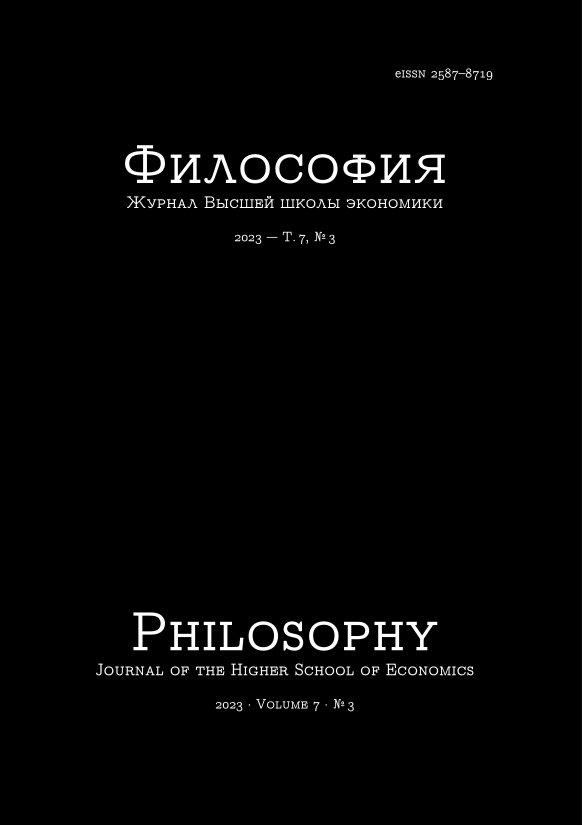 Power and Society in the Works of Russian and Western Intellectuals
Vol 7 No 3 (2023)
Power and Society in the Works of Russian and Western Intellectuals
Vol 7 No 3 (2023)This issue opens with a block of materials related to Alexander Hertzen and his intellectual heritage. Among these, here are Yevgeniy Blinov and Fyodor Gayda’s works. Blinov's article "The Most Independent Man in the World": Hertzen on the Origins and Meaning of Russian Nomadism analyzes Jules Michelet's pamphlet Democratic Legends of the North, Hertzen's response to it and Michelet's subsequent reaction. The author analyzes the problem of freedom, the opportunity to see in Hertzen's reasoning a logic close to the modern search for the potential for resistance to the disciplinary techniques of power among "primitive" communities, and Michelet's characteristic insensitivity to these arguments. Fyodor Gayda, in the article Burden of Responsibility: Alternatives to the Ideological Transformation of Populism in the 1880s offers a non-trivial view of the logic of the ideological transformation of populism, interpreting the crisis of the 1880s as ultimately forming the main directions of the ideological and cultural life of the 1890s – 1910s, in particular - the ideological framework for the culture of Silver Age.
The issue continues with a block of articles related to "Philosophy between the Enlightenment and the Empire." Here are articles by Anastasiya Ugleva, Artem Krotov, Mikhail Golubov and Ivan Kurilovich. Ugleva's paper analyzes the revolutionary ideas in the field of public education of the 18th-century French thinker Nicolas de Condorcet as the fundamental basis for the political and social transformations of contemporary France and, at the same time as an exceptional example of the formation of popular sovereignty through the construction of a unique scientific and educational paradigm aimed at enlightening and educating citizens, capable of autonomous judgment and socially responsible action. Krotov's article analyzes the main provisions of the political program of Napoleon III, affecting his understanding of the meaning of history, and Golubev and Kurilovich consider the problem of heteronomy of the subject of self-consciousness within the framework of the philosophical project of the French neo-Hegelian Alexandre Kojève.
Helena Knyazeva’s article discusses creative education and creative teaching as the foundation of modern educational policy focused on a sustainable future. Alexander Marey turns to analyze ideas about power in historical research, and Maria Marey writes about the concept of judgment as a political problem.
The issue continues with a discussion around Valentin Bazhanov’s article about artificial intelligence, Big Data technology, and the features of the modern political process, as well as responses to the article by Sergey Nikolsky, published in June of this year.
In the rubric "Translations and Publications," we publish two materials. The first is a memoir sketch by Irena Zhelvakova, the creator and director of the Herzen House Museum in Moscow (Department of the V. I. Dahl State Historical Museum of Literature). Written with lively humor and a keen eye, it makes it possible to feel the density and diversity of the cultural and intellectual life of Moscow in the 1950s – 1980s, the atmosphere in which new things take place, directly influencing us to this day, an appeal to Herzen, Decabrist, and then populist and Narodnaya Volya issues. The publication is accompanied by an introductory note by Andrey Teslya, and he also has a review of Letters to Brother Anthony, published in 2021 by the PSTGU publishing house by Georgy Florovsky, covering the period from 1946 to 1968. Florovsky's first major scientific work was a study of the paths of the intellectual development of Alexander Herzen - and attention to Herzen did not leave Florovsky throughout almost his entire intellectual life, in understanding him as one of the key figures not only of the Russian but also of the pan-European 19th century.
The second text is a partial translation of Hobbes' Leviathan, i. e., chapters 17 and 18, performed by Elizaveta Stoliarova and edited by Alexander Marey. In these chapters, Hobbes describes the Leviathan's formation as a result of the agreement entered into by people and discusses the necessary rights and prerogatives of the highest authority in an established civil community.
Among the book reviews, in addition to the already mentioned text by Andrey Teslya, there is a review by Mariia Stenina of Aurélie Névot’a book Le ressac de l’altérité. Marc Richir et Pierre Clastres à l’épreuve de l’ethnologie, Oleg Aurov on Discourse on Dictature by Donoso Cortes and Anna Lazareva on the book by Christina Gschwandtner Welcoming Finitude: Toward a Phenomenology of Orthodox Liturgy.
The issue ends with a report on the II International Colloquium, organized by the RANEPA Institute within the project "Intellectuals and Power" framework.
-
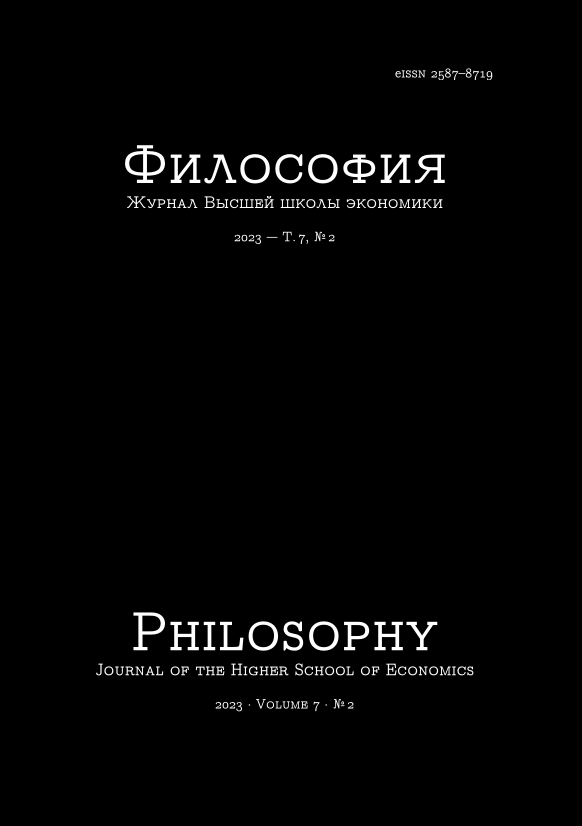 Contemporary Philosophy
Vol 7 No 2 (2023)
Contemporary Philosophy
Vol 7 No 2 (2023)The 26th issue of “Philosophy. Journal of HSE” opens with an article by Olga Togoeva devoted to reflections on tyranny and the struggle against it. The article is devoted to the analysis of the Justification of the Duke of Burgundy, written by the theologian Jean Petit in 1408. Tyranny is considered here as not only a political but a moral category, as a particular state of the soul and mind, which later turns into a way of life and guides one’s actions. A continuation of this topic is an article by Yelena Kosilova which treats the correlation of power, knowledge, truth, and freedom as a rejection of power but not the possibility of interpreting the world. Alina Kostina, in her article, examines the problem of ignorance in the framework of social epistemology—epistemology of virtue and feminist philosophy, as well as the methodology of science—where ignorance is perceived not as an empty space, which can be filled with knowledge, but as a tool that structures cognitive activity.
Tapdyg Kerimov deals with the theme of criticism in his article, which reveals the theoretical background and motives of the "post-critical turn" in the humanities, the basic principles of post-criticism, and the difficulties it faces in updating traditional criticism.
The following articles are also devoted to philosophical and methodological reflections. Yevgeniy Popov provides a conceptual description of the hard core (in Lakatos’ terms) of new materialism in social theory, which, the author stresses, has not been clearly defined in socio-philosophical and sociological discourse so far. In the article by Anton Sukhoverkhov, Irina Kobyakova, and Il’ya Pozdeyev, the authors focus on the philosophical and methodological study of various evolutionary models. At the same time, Filipp Emanuilov addresses the formulation and solution of the problem of individuation in the context of the processual philosophy of biology.
The first part of the ‘Studies’ completes with two articles. Anton Kulikov provides an approach to the analysis of thinking based on the philosophical interpretation of the legacy of Leo Tolstoy as myth-making. Sergey Nikol’skiy turns to the theoretical study of two important social tasks: the reorganization of society and the re-creation of the human.
The issue continues with three articles from the new section, "Logic and Epistemology." Alexei Krouglov focuses on the concept of criticism and the critical method of Immanuel Kant, where—along with the general characteristics of Kantian criticism as a whole—the specific metaphysical meaning of criticism is also shown, according to which it represents a via media between dogmatism and skepticism. The article by Artem Pimanov considers the premises for the formation of transition semantics in the context of the problem of determinism. In her article, Natal’ya Zaytseva discusses the cognitive substantiation of visual representations and reveals the role of visualization in reasoning and proof.
The section "Translations and Publications" contains two translations provided with commentaries and introductory articles. Aleksey Pavlov presents the translation of the article The Possibility of the Resurrection by Peter van Inwagen, as well as the translation of a letter by G. W. Leibniz To Monsignor by Andrej Egunov, provided with introduction and comments by Roman Svetlov and Vyacheslav Minak.
The "Reviews" section includes four materials on new books published in Russian. Aleksandr Markov’s review is dedicated to Vladislav Sofronov's book State of the Dead: A Revisionist History of Russian Cosmism. Aleksandr Loginov reviews the Russian edition of M. Scheler's article On the Idea of Man. Alexander Marey reflexes on Dmitry Bondarenko's book Post-Colonial Nations in a Historical and Cultural Context. Andrey Teslya writes about Vladimir Bashkov's book A Rehearsal of the Political: Soren Kierkegaard and Carl Schmitt.
-
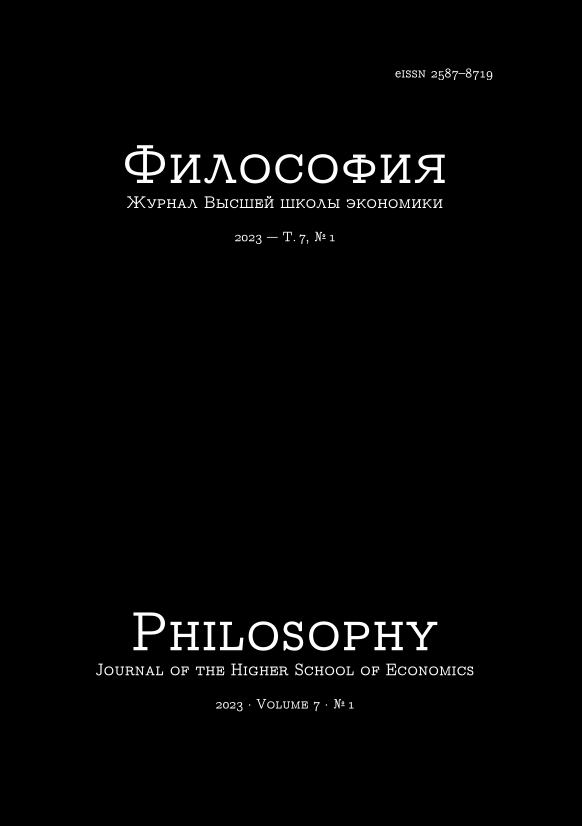 Contemporary Philosophy
Vol 7 No 1 (2023)
Contemporary Philosophy
Vol 7 No 1 (2023)We proudly mark the seventh anniversary of our journal with this twenty-fifth issue. The journal is evolving, and we hope for the better. We are transitioning from thematic issues to thematic headings, which we believe will foster a more open atmosphere for authors and readers of the journal. On a larger scale, the structure of the issues will remain the same, featuring articles, translations, new sources, and reviews of scientific literature.
In the opening article, Svyatoslav Kaspe reflects on the connection between politics, war, and Christian love in contemporary political culture. He believes this kind of love is an effective institutional channel for partial de-autonomization of the political and, in turn, may help to curb the war. Oleg Kharkhordin, the author of the second article, shifts the focus to the theory of mixed government. Through the analysis of Dion Cassius' text, he emphasized that the correct version of this theory allows for the simultaneous existence of different forms of government. Aleksey Zygmont's article follows, bringing readers back to the concept of political love, this time in the form of political martyrdom.
In the Research section, Oleg Nesterov, Oksana Koval’ and Yekaterina Kryukova articles take the reader away from political emotions to modern society's political and socio-philosophical problems. In the first article, the author comes to the conclusion that imposition of paid digital leisure (i. e., nudging) will lead to leisure becoming a form of digital labor, resulting in a person losing freedom and becoming involved in new forms of dependence, creating a new type of labor and economic slavery. The second article analyzes Michel Foucault's essay This Is Not a Pipe and Rene Magritte's painting The Treachery of Images, formulating three basic principles of “emancipated” aesthetic judgment from Foucault's groundbreaking approach to the interpretation of Magritte's work.
Yevgeniy Miroshnichenko's article builds upon his previous study of zaum’ language, published in one of last year's issues. Yuriy Romanenko delves into the intricate relationship between philosophy, power, and evolution, utilizing Vladimir Bibikhin's writings as a foundation for his exploration.
The section is concluded with four more articles. Igor’ Dmitriyev, the first author, reflects on the clock metaphor in modern European philosophical thought. He notes that in Early Modern times, the clock was associated with mechanical philosophy, as seen in the works of R. Boyle and R. Descartes. Over time, however, the clock metaphor lost popularity, becoming a symbol of regulation and oppression, an unfree mode of action, and rigid determinism. Ivan Karpenko delves into the concept of free will in a simulated world, using the example of an open-world video game. He illustrates how the observable universe can be seen as one of the many potential realities of the multiverse and how the idea of free will can be explored in such a world.
Sergey Shevchenko examines the difficulties of ethical expertise and the potential pitfalls of those who conduct such research in science, as they may find themselves mentally situated between an imagined public and scientists. Mikhail Voloshin's article on the contingent of genetic information sparked a debate with Ivan Kuzin, whose article was published in the second issue of our journal last year.
The Translations and Publications section features two interviews conducted by Timur Atnashev with Vitaliy Kurennoy and Aleksandr Marey. Both researchers discuss the problems of contemporary political philosophy and the university teaching of philosophy in Russia. It is worth noting that these interviews are only a small part of a larger project by Timur Atnashev, and we look forward to seeing more of it in our journal. These interviews were taken back in 2021 and now serve as a time capsule of the past, a reminder of what was but is no longer.
Alexander Pavlov and Yuriy Razinov's reviews, along with Maxim Gorbachev's reflections on the book, bring the issue to a close.
Editorial Team
-
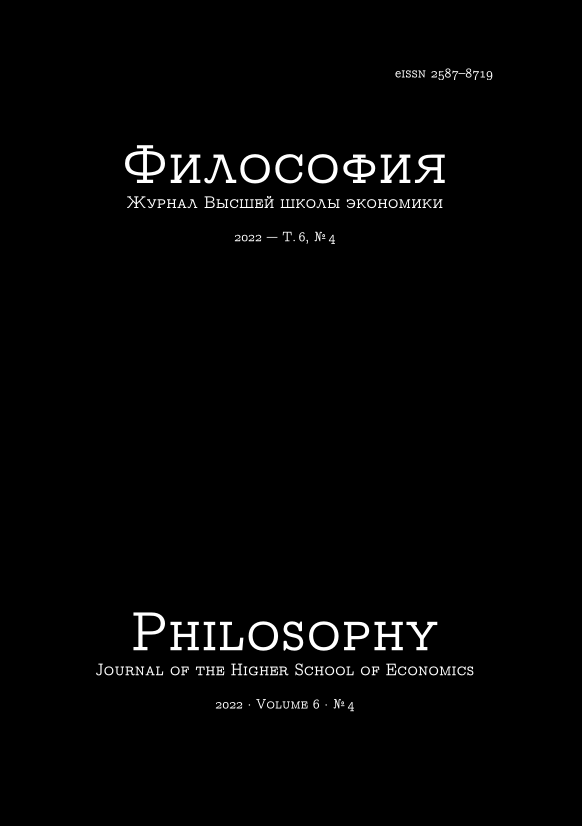 Power and Authority in Medieval and Early Modern European Political Culture
Vol 6 No 4 (2022)
Power and Authority in Medieval and Early Modern European Political Culture
Vol 6 No 4 (2022)Medieval culture elaborated a notion of power from the classical Roman and Christian heritage of the Early Middle Ages. That is the reason why medieval authors were not fully aware of the concept of “the Political”; and when they had to speak about political matters, they generally used one of two principal discursive modes: juridical or theological. Roman thought provided the concept of power with a terminological apparatus (words such as potestas, auctoritas, dominium, imperium, and iurisdictio), and comprehension of power as a property of one or another social position. Such interpretation of power made possible the appearance of the medieval conception of emperor's potestas — it is well known that during the whole Middle Ages the emperor was an elective leader, who, officially, received his power from the people according to lex regia. Those who decided the next emperor's candidature were not the people but prince-electors and the Holy See. However, the juridical fiction of the electio populi conserved its importance all the time.
Christian theology added to the Roman “republican” interpretation of power the sacral or “vertical” dimension. According to Paul's Epistle to Romans, “there is no power but that of God” and, as a consequence, each person who “resisted the power, resisted the ordinance of God” (Rom. 13:1–2). In contrast to the Roman practics, where power could be reached by completing some well-known procedures (an electoral campaign, e.g.) and hence it could be interpreted as the desired result, as a prize for a victory, in Christian thought the situation was different. According to theologists, the power of Christian monarchs, the “God's ministers” (Rom. 13:4), was more like a burden than a reward for their virtues. The great responsibility that power imposed upon the shoulders of rulers required them to sacrifice their time, strength, and even lives for the sake of their subjects' souls.
Thus, a good king was, in fact, a sort of martyr. Isidor of Seville stressed this in his Sententiae stating that the kings who rule piously, after their death would remain kings in eternity. Isidor's favourite disciple and closest friend, Braulio of Saragossa, wrote in one of the laws of Liber iudiciorum that “a good prince ruling well his kingdom, and making foreign conquests, maintaining peace at home, and overwhelming his foreign dversaries, is famed both as the ruler of his state and a victor over his enemies, and shall have for the future eternal renown, after terrestrial wealth, a celestial kingdom after the diadem and the purple, a crown of glory, nor shall he then cease to be king; for when he relinquished his earthly kingdom, and conquered a celestial one, he did not diminish, but rather increased his glory”.
Later, the same metaphorical line was used by authors of the Carolingian conception of the royal unction. They interpreted the sign of the cross, which the King received during the unction procedure upon his right shoulder, as a metaphor for Jesus' cross burden. The King, as a result, became a Deus per gratiam or Christus per unctionem and his rule was explained as an analogy of the final Christ's road, the Via Crucis.
Based on the above, we have compiled several works in this issue that deals with the theme of power in medieval thought, interpreted from various positions. Nikolay Antonov and Elga Kanayeva study the Byzantine aspect of the theory of power. Their articles describe the confessor's hypostasis (shepherd, physician, and intercessor) from one side, and analyze the arche of the priest from another. They both deat with the concept of charisma introduced by st. Paul, later developed in Byzantine thought. The issue continues with three other articles, where the European Latin position is exposed. Firstly, the text of Sebastián Provvidente deals with the struggle between conciliarists and papists during the famous Council of Constance. Secondly, Arina Zaytseva's article stays within the Canon law field and analyzes the correlation between the concept of justice and that of ius strictum in the “Processus Sathanae contra genus humanum”, a treatise which is ascribed to Bartolo da Sassoferrato. Finally, the brilliant study of Joseph O'Callaghan that closes this issue, deals with the famous Castilian theologist Juan Gil de Zamora and the instructions that he gave to Sancho IV, king of Castile, while he was an infant.
The book review section opens with a text by Nikita Fedonnikov, who reviewed a collective monograph dedicated to the image of tyranny in European medieval thought. Fedor Nekhaenko makes an excellent review on the recently published course read by Alan de Libera at College de France.
We hope that the reader will find a coherent path that both denotes and explains some of the central points that occupied medieval thought concerning power and its use.
Daniel A. Panateri and Alexander Marey
-
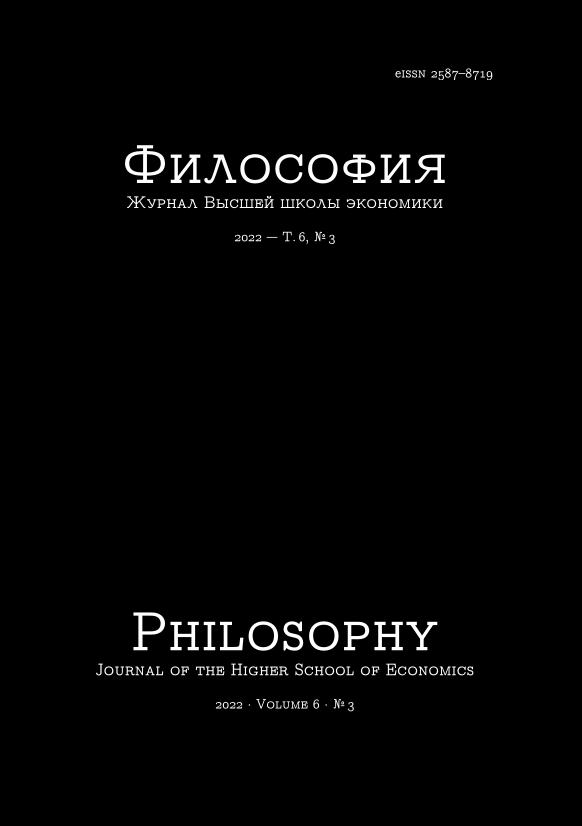 Vladimir Bibikhin's Philosophical Heritage
Vol 6 No 3 (2022)
Vladimir Bibikhin's Philosophical Heritage
Vol 6 No 3 (2022)In October 2021, the Third Bibikhin Readings were held in Bezhetsk (Tver Region), which once again brought together well-known experts and young researchers from various Russian universities from St. Petersburg to Rostov-on-Don. The special issue of Philosophy. The Journal of the Higher School of Economics on the relevance of Bibikhin's philosophy gets published concerning the Bezhetsk conference. The selected articles present large-scale authentic Bibikhin themes such as “the Event”, “the moods”, “the woods”, “one's own”, and so on. The special issue opens with the article by Mikhail Bogatov, co-authored with Dar’ya Pavlova, which poses a methodical task to formulate the difficulties that arise when describing the “Invisible Community” of Vladimir Bibikhin. It deals with the circle of interlocutors who co-determined the intellectual atmosphere of Moscow in the late Soviet and post-Soviet period and implicitly formed the context of their creative searches. The object of consideration here is deliberately general: pre-lecture and lecture periods of Bibikhin's philosophical work. The theme of self-recognition in Bibikhin's philosophy is the focus of the following article. Kate Khan refers to the early lecture courses of the late 1980s – early 1990s. “World”, “Know Yourself”, and “Property” reconstruct how Bibikhin's “hermeneutics of the Self” unfolds, showing how it differs from the psychoanalytic interpretation of the personality. Yevgeniya Shestova explores with Bibikhin's hermeneutic ethics a new dimension of hermeneutics that opens up in a specific “ethics of reading”: the latter is understood not as a technique but as a praxis of human life that responds to the Event of reading. Anastasiya Merzenina pays attention to Bibikhin's reflection on Russian history in the context of modern political philosophy. Her article Political “Event” and Law in The Philosophy of Vladimir Bibikhin: Ontic Aspect and Superhethic Dimension comes from an exciting hypothesis that the political subject of Vladimir Bibikhin is always in the sphere of political decision and cannot be excluded from it. A bold study by Daria Efimova takes on another non-standard topic: Intoxication by the Woods as a Case of Captivation. Reflections on “living matter” in the lecture course The Woods (Hyle) are compared here with the interpretations of some commentators on Aristotle (Tatyana Vasilyeva, Paul Ricoeur, Alexei Chernyakov). The comparison goal is to move from the historical and philosophical perspective to the phenomenological question, “In what relationship with matter are we?”. Finally, in the articles Intuition of Faith in the Religious and Anthropological thought of Vladimir Bibikhin and Authentic and Philosophical Anthropology of Authentic and Non-authentic: Modern Problematization of Human Person and Way of Life, several significant existential-anthropological problems related to the religious dimension of Bibikhin's philosophy are raised. Dmitriy Ustimenko extracts the “intuition of faith” or the “ontology of faith” of the Russian philosopher from disparate facts and statements, which are pretty accurate and self-significant. A whole range of characteristics of faith unfolds sacrifice, fidelity, trust in God, riskiness, and confidence. And in a large-scale study by Daniil Dorofeyev again sounds, the theme of “recognizing oneself”: consideration of the well-known Bibikhin interpretation of Alcibiades I in the course Property is preceded by an appeal to the personalistic concept of M. Scheler and the distinction between eigentlich and uneigentlich in M. Heidegger's Dasein-analysis. The author creatively rethinks this material in the light of his philosophical task — to reveal the positive ontological and personal potential of everyday existence. In the spirit of patristic hermeneutics, he proposes four possible models of the relationship between the authentic and the non-authentic, typologically traceable to the New Testament images of Martha and Mary.
The second block of studies in this issue includes six articles, united by widespread attention to the problems of moral and political philosophy. The article Justification of Epistemic Authority: The Potential of the Liberal Model of Responsibilism, co-authored by Ol’ga Boytsova and Svetlana Khmelevskaya, attempts to comprehend the justification of epistemic authority in the liberal model of responsibilism. Authors try to determine the heuristic potential of the argumentation proposed within its framework and show the problem fields promising for conceptualizing epistemological authority. Further authors reveal the model's advantages, trying to explain the mechanism of authority's action, identify how authorities are ranked in the case of their competitive interaction, to highlight the grounds for subordination to authority on the part of an individual. The article by Andrey Zheleznov explores the notion of morality in experimental moral philosophy. The author emphasizes that experimental moral philosophy shows morality as a striving for a good that surpasses any given experience.To prove this statement, he discusses several studies that share a methodological paradigm that involves the use of natural and social sciences methods to study the content and mechanisms of the functioning of morality. Also, he focuses not on the discussion about the direct results of experimental research but on the debate on the attitude to morality, which manifests itself in such studies indirectly. Yelena Kosilova, in her article Conceptualization of the Absurd in Philosophy: From Logic to Logic of Sense, considers the question of what the absurd is. Her interest is what understandings and conceptualizations of the absurd can be found in the history of philosophy. It shows that, in the first approximation, absurdity exists in two forms — semantic and existential, where semantic absurdity is interpreted as a characteristic of the statement and existential as a characteristic of human existence. The article by Konstantin Dushenko, entitled The Concept of “Russophobia” among Russian Authors of the 19–20th Centuries, pays special attention to the linguistic and conceptual aspects of the phenomenon under study. The author examines the term “Russophobia” and the context in which this term was used. Aleksandr Markov devotes his article Contemporary Russian Poetry in the Period of Intense Events to an analysis of the changes that have taken place in Russian poetry over the past six months, starting from the 24 of February. He analyzes the influence of being inside the intensive development of events on contemporary Russian poetry as a set of institutions for producing and consuming texts. Also, he proves that under such an impact of events, not only individual ways of existence of texts change, but also the very meaning of the media and social contexts of the existence of poetry. Poetry turns out to be an area not so much of understanding the current reality but of differentiating the very methods of expression representing modernity. Finally, Aleksandr Mel’nikov, in the study Concerning the Problems of Applicability of Speech Acts Theory in Free Speech Discussions: On Some Examples of John Austin, draws attention to the classical concept of speech acts developed by J. Austin. He emphasizes that the theory of speech acts, effectively linking the utterance with the action, is not applicable in practice as extensively as one might expect. Moreover, he seeks to reveal the boundaries of the convergence of utterance and action in the example of J. Austin's canonical lectures.
The issue continues with the section Publications and Translations, in which the translation of an early article by Hans Blumenberg Das Verhältnis von Natur und Technik als philosophiscehes Problem is published. The translation was made by student-philosophers Kirill Bodenko, Petr Zelensky, and Petr Filatov under the guidance and editing of Alexander Mikhailovsky and provided with his introductory article.
Book reviews by Elena Besschetnova, Anton Kulikov, Vladimir Bliznekov, and Maiia-Sofiia Zhumatina culminate the issue.
Alexander Mikhailovsky and Konstanin A. Pavlov-Pinus
Executive editors of the issue -
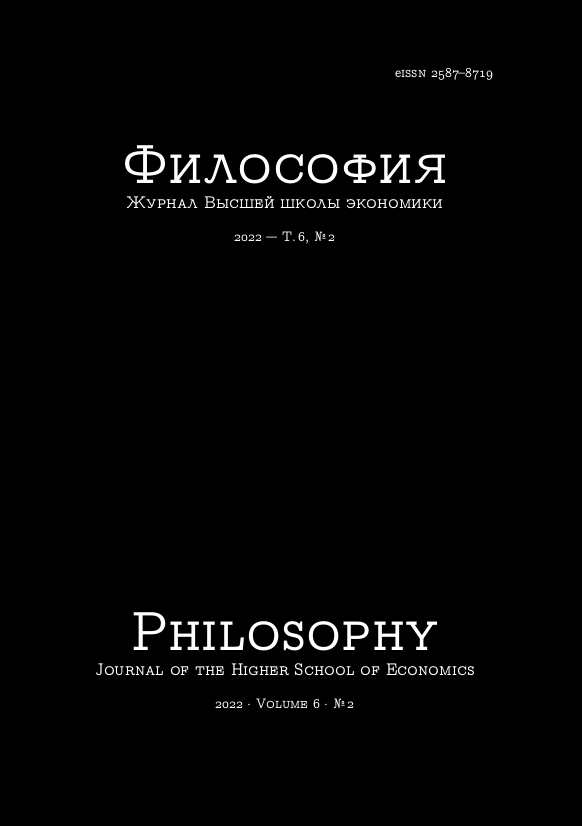 Situations of the Canons. Part 2
Vol 6 No 2 (2022)
Situations of the Canons. Part 2
Vol 6 No 2 (2022)This issue is a continuation of the discussion about the canon started in the previous issue, which provided mainly texts on philosophy and intellectual history. However, the second issue covers topics on canon in science and culture.
Focusing on the canon, one commits to the process of transferring. Literature or art canon is understood as a proper way to follow. The classics are increasingly directly referred to science. Classics are not solely related to the classrooms, where the main books of disciplines are studied; it also relates to the classics of Antiquity, where the foundation of the humanities and social sciences of the New Age can be found similar to the way nature works the natural sciences as a fundamental concept.
Here the question arises: is it possible to apply the term “classics” to the intellectual issues of the past centuries, which go beyond the domain of science? We are not sure about it. Addressing to this term frames the evaluative framework of the discussion about the oblivion or collapse of the classics. Thus, “canon” can be more precise in describing possible internal connections and foundations inside the field.
Unlike classics, the canon has no historical and historic presuppositions. Neither it is connected to a particular epoch that should be a kind of common land to all areas of science and art. It forms inside a particular field of activity — art or sciences. Thus, individuals become canonical figures; certain notions may enter the canon field and leave it. One can turn to philosophical foundations from the canon, or philosophy can help one understand or overcome something that transcends the discipline.
In this issue, we have texts not about disciplines but on various intellectual areas: from fanfiction to information in biology. The authors uncover the essence of the canon and the way it is rooted in the sciences and arts and sometimes bizarrely overlapping. Thus, science appears in the article dedicated to the representation of maniacs in the TV series; the STS canon moves us to literary canon discussions. In some cases, like one with the concept of information in Ivan Kuzin's article, the key canonical concept is borrowed from another field of knowledge, so it becomes a basis in science, such as biology. Sometimes the canon is produced in the practice of writing, as Nata Volkova shows in her study. Hence, the place of the canon is different, however the role becomes more precise when you read the texts one by one.
The issue opens with a conversation with Alexander Filippov held by Polina Kolozaridi and Andrey Teslya dedicated to the destiny and structure of the canon in sociology. The conversation begins with the problem of canon's ambiguity, particularly its educational and research methods. However, the conversation's fundamental problem is a canon's transformation under the influence of inter- and intra-scientific factors. Sociology can explain both crisis and stabilization processes in society, but it thrives in the latter. It can expand and turn to other theories in crises, and the discipline itself changes. At the end of the conversation, the interlocutors argue the destiny of those who use sociological language (like studies and research areas) or seek other foundations of the canon, like Alexander Filippov or Bruno Latour, who unexpectedly emerges in the final part of the talk.
Bruno Latour will also be mentioned in the following text, a study by Nataliya Volkova. The key person of her interest is the one of the Lancaster School of STS (Science and Technology Studies), John Law. In the empirical study, Nataliya reconstructs the School's texts and demonstrates their relations with literary and scientific canons. Her reconstruction is not simply a way of organizing the text. It demonstrates literary structure as a way of producing scientific knowledge, consistent with Lo and the other Lancaster School authors' understanding and proves the relationship between science and literature. It helps to understand that the sociological text is indeed a text situated between science and art. Nataliya’s article is in line with Lo's approach in his reference to the canons of other sciences. It allows the reader to see how the argument (and articles) of the Lancaster School of STS unfold.
Polina Kolozaridi and Lenya Yuldashev's article on the canon in Internet Studies continues the theme of sociology as a part of the canon. This research field is usually disassociated from its status as a discipline, not even university departments or textbooks. By examining institutions and several figures in the research field, the authors demonstrate how canonicity arises from a combination of approaches and themes and attention to the research object: the Internet. A community without discipline indulges in both the creation of its object itself (the Internet) and some discussion of its political role. However, it includes neither disciplinary knowledge nor philosophical debate, equalizes different kinds of classical knowledge and fundamentally does not problematize them. This mode of intellectual action is becoming canonical within Internet research.
Fortunately, in the world of the endless diversity of studies, there are sciences, particularly biology. Ivan Kuzin problematizes the notion of “information” as key in genetics and molecular biology. His article first explains how information became part of biology (there have been alternatives in this formation). However, the bulk of the text shows how other epistemological situations are possible. They are hard to imagine because the concept of DNA, genetics, and even everyday conversations about biology include the concept of information. Nevertheless, using the examples of the mathematical theory of information and various theories of specificity, Ivan claims that both the understanding of life and the role of information can change toward an approach to existence as a general flow, where information as something separate does not play an essential role.
Maria Marey's article also addresses a specific and universal problem: the image of the maniac as the villain in the TV series. Maria focuses on the fact that evil and danger in the series prove to be gradually not monstrous. They become every day and, at the same time, exceptional, which is embodied in the maniac figure. However, this figure does not just exist but also establishes itself as an explanation. Based on the Criminal Minds, the article presents explanations for maniacs from science. Moreover, in the end, it turns out that science and the way evil is clarified become part of the canon in the series..
The block on canon concludes with an article by Ksenia Romanenko. This text focuses on those groups of authors who have been working with the concept of canon far longer and more thoughtfully than we have in this journal — fanfiction writers. Theories of literature (and, in fact, Harold Bloom, who was one of the inspirations of this issue) often emphasize that literary history draws heavily on the stories of predecessors. However, institutional actors also appear in this history, and Ksenia's article is about communities. Both communities and texts are emerging simultaneously; this is how fanfiction is produced. This text also explains the work of reflection on the canon and how it leads to forming new rules.
We hope that the rules for recognizing and being with canon will continue to be an issue for the researchers. However, this brings to an end our two-issue discussion on this topic. Apart from this topic four articles are presented in this issue. The block is followed by Andrey Teslya’s article about Lidia Ginzburg's reading of Marcel Proust. It also addresses an innuendo to the problems of the canon. After all, Lidia Ginzburg finds Proust's novel In Search of Lost Time as a way of addressing reality as it was placed in a world where reality is constantly dissected. More precisely, the novel was an invention of a method adequate to time, a method to reconnect words and things into an inseparable entity. The article by Alexander Sanzhenakov and Denis Maslov also partly deals with the change of the canon. They focus on the sceptic's critique of Stoic philosophy and show how it influenced stoic reflections on the interdependence of epistemology and ethics, which eventually led to the emergence of Roman Stoicism.
The issue continues with our new column, Women in the History of Philosophy, which opens with an article by Maria Rakhmaninova about Simone de Beauvoir. The author focuses on understanding the Soviet in Beauvoir's political optics; this subject is underestimated in the research literature. Rakhmaninova also refers to how Beauvoir herself described the controversy around the events in Spain in 1936 or the policy of the USSR during World War II, her efforts to take (if possible) a neutral position, and her ethical reflections. Fedor Stanzhevskii, in his article, analyzes the criticism of substantialism or the “myth of substance” in Johanna Seibt's theory of universal processes. The article presents the theory of universal processes as non-particular individuals whose model is subjectless actions. It outlines the solution to the constancy problem in time from the theory of universal processes.
The discussion about political biology as a phenomenon of the post-genomic era attempts to critically comprehend the nature and features of forming a new scientific direction. It was conventionally called political biology and is considered “revolutionary” due to overcoming the traditional boundaries between “knowledge of nature” and “knowledge of about the spirit.” In this direction, the synthesis of key ideas is carried out both from biological knowledge and political science. Panellists agree on the partly metaphorical form of the notion of “political biology”; however, they disagree about the mechanisms for expanding the boundaries of “epistemological imperialism” as the new direction progresses. Furthermore, they discuss its potential impact on political processes (primarily related to the dangers of simple political decisions based on scientific evidence) and the deterioration of the political climate. They also have some discord about a result of such actions, about the prospects for constructing new social structures that can limit a person's free choice in planning his life and posterity. Finally, panellists raise issues which may be the subject of future research.
The issue ends with Alexander Markov's review of Yoel Regev's book, which has grown into a detailed reflection on the views of this author, and the announcement of a future scientific conference.
Polina Kolozaridi, Andrey Teslya
-
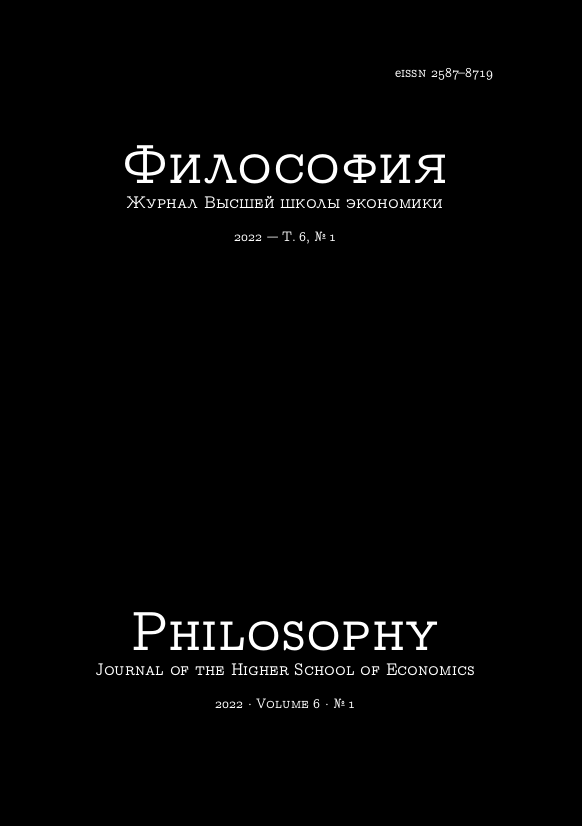 Situations of the Canons
Vol 6 No 1 (2022)
Situations of the Canons
Vol 6 No 1 (2022)This introduction has been written much later than all the other texts in the first “Philosophy. Journal of the Higher School of Economics” journal issue on canons. When the articles in the first issue were produced, key academic discussions in Russia were, for example, concerned with the interdisciplinarity, or the author's position in the text. The borders between science and research were the most dangerous borders on these discussions. Now, in March 2022, Russian academics are concerned with different boundaries; dozens of academic events are canceled every day, scientists are disconnected from their fields and from each other, and these disconnections are not yet fully processed and reflected. Given this, we can hardly imagine in what context and how this journal issue will be read.
The meanings and intellectual values of the topic has changed for us, while we have been working on this issue. We planned to start this introductory article by referring to Mayana Nasybullova's artwork REMOVAL. It is a video in which Mayana makes a perfect sculpture of a woman's body and then tries to relate it to her own body. She struggles to tape a hulk of plaster over her bare legs and arms. The plaster barely holds. It looks like armour that is out of her height. Mayana tries to walk with this wreckage of canonical sculpture on the road. She is in pain, but she keeps moving. It seemed to us that the canon is often perceived, including in academic circles, in this way. As something that has form, connected to us tightly, but difficult to incorporate into its movements.
The articles in the issue describe as an opportunity to refer to something that was before us, but which has a direct connection to what is happening. In this status, the canon adds to the meaningfulness of modernity. The canons have survived a lot, they have developed in different ways, and we can look at them as a possible armour - they are still not easy to relate to, but they can protect. And they contain and enable own sense beoynd any external conditions.
***
The concept of canon itself is rarely used in relation to the sciences. In many ways, the notion of the classical/ classic is more accurate for many reasons. In the 2000s and 2010s, this has been the subject of several collective monographs written by colleagues at IGITI, Irina Savelyeva and Andrey Poletaev. The authors separate the canon and classic for several reasons. Classics is the foundation of the discipline, it is something that has a clear role for science and is amenable to study. The classics are what is studied in classrooms, they are necessary for examinations, understanding of history and the basics of the discipline. The canon rather acts as a model and at the same time a list of sacred foundations. Science is secular, the canon refers to religion.
One could say that such a reference discredits the role of the canon as part of academic life. But what is a weakness of the concept of the canon in academia turns out to be its strength for understanding how knowledge is produced. The canon is not only a model and a list of predecessors, but it is also a literary canon that may (or may not) exist in order for knowledge and texts to establish continuity[2]. Canon is challenged during a series of transformations, but still exist in particular historical circumstances. Canon is a tool and basis. It is rooted in the past, necessarily actualised in the different versions of present. It preserves the essential and questions it at the same time. Finally, the canon is important for collective intellectual life. It works as a reference to invisible interlocutors or friends from the past.
This issue brings together texts that address the canon in precisely this sense - not by trying to replace the "classics" with this notion, but by addressing the different kinds of coherent knowledge that often emerge on the periphery of the institutional sciences. The methods of studying the canon are not strictly historical and philosophical, they paradoxically exist without the canon. This became a problem for us as editors: we either had to initially offer some notion with a definite methodological apparatus, or leave the issue on canon non-canonical.We chose the second option, as it allows the texts to be closer to their objects of study, without setting an initial and general distance. But this is a weak solution - we hope that the texts in this issue will serve more as a starting point for the next canonical study.
The texts are devoted to different subjects: the history of concepts, intellectual movements, the introduction of new political an intellectual problems, educational programs. They are united by the fact that the canon is not situated by chance, it establishes and changes both due to internal and external reasons. In such a way of understanding the canonit is neither the prerogative of the humanities or social sciences. Canon appears as a concept that shuttles from humanities to social sciences and vice versa. We hope that such a way allows to recognize different ways of understanding the causality and role of processes and actors.
***
Two lines of tension are embedded in the structure of the issue. The key one is the formality of the canon, its existence in institutions and outside them, in different ways of acting in intellectual worlds. In the content of the issue we move from the less formal ways in which the canon exists to the more formal ones. The issue begins with the vicissitudes of terms and concepts and ends with the fate of university science. In between there are stories of changes, of the formations and inventions of canons.
The second line of tension is the question of what is, in fact, a canon. The canon is not only a text, a concept or a figure, it is also a kind of relationship between those for whom it operates - authors and texts of the present and the past, readers, critics. This particular kind of relationship does not just exist ephemerally, but is framed in certain ways as something that exists in words and texts.
***
The issue opens with an article by Fyodor Gaida on the concept of “sobornost’”. In its history with 1840s - 50s, very different subjects are intertwined: free unity, collegiality, conciliar governance, collectivism, public and national unity. The concept of sobornost turns out to be not universal and cannot include all of these meanings. The canonical understanding of sobornost’ can refer either to the origin of the concept, or to its history. The author insists on the importance of historical, dynamic understanding.
The following text is about the vicissitudes of (viszantism) Byzantium, Dmitry Biryukov, refers to the history of the concept between scientific, ideological and historiosophical contexts. Differences in the interpretations of "Byzantism" are explained, not exclusively, by the role of Greek heritage and Byzantine modernity in the rise of Western thought, and progressive logic of a significant (predominant) part of historiosophical/historiographical traditions.
The research by Nadezhda Vinyukova offers a critical analysis of the concept of intelligentsia, from the religious to the secular and critical meanings. Text questions the secular nature of the foundations of criticism as a central concept for intelligentsia. This article works both with a social group and with the term that signifies and manifests it.
A similar problem is at the center of Alexander Markov's research's of Samizdat movement. The movement had shaped own the canon of religious thinkers, including him those who can confirm their intellectual and political position. Although the text raises questions rather than offers a methodological path, it is worth following it in the study of the canons of informal movements (although partially formalized after in universities later).
The establishment of a canon is not only a performed by intellectual movements, and this can be understood in the article by Bogdan Gal. He considers the police canon that originated as a result of the emergence of a new institution (police) in the Russian Empire. The research is comprehensive: it starts with institutions and their intellectual design, and finishes with fiction and public reaction.
Daria Drozdova's article also places the canon in an institutional context. She examines the textbooks on philosophy and questions exactly turns out to be philosophy in them. The key distinction in textbooks is the distinction of Modern. It provokes a struggle on what is he key foundation for philosophy and the question of method. The analysis emphasises that it is based both on the point of view of main representatives and the narrative. The canon here turns out to be both a question of content and a method for intellectual action.
For study of the later period, the classicization of Sergei Veselovsky in Soviet universities, demonstrate how the canon works as a redundant concept. Temurmalik Kholmatov insists on the concept of classics as the base for this case and probably it is more appropriate for the twentieth century as a whole. This allows you to see the canon and the classics as two different approaches and understand the difference between them.
The section closes with the article by Andrey Teslya on dedicated to how the texts and biographies of those who shape the understanding of Russian history struggle for establishing the canon. In the research of Pokrovsky and Plekhanov, we see that the role of the state turns out to be not only an object participating in the formation of the canon, but also active subject. This makes the canon an issue on a larger scale. We see in this text how being a basic can be problematic, how it can (or not) be separated from the texts and become a matter of fate of the intellectual worlds.
The second research section includes two articles written by Timur Shchukin and Evgeny Miroshnichenko. Both of them are devoted to the problems of the philosophy of language, and specifically to the reception of the linguistic philosophy of Alexander Potebnia in the works of Alexey Losev and consideration of the so-called "abstruse language" in its relationship with the theories of Pavel Florensky, W. von Humboldt and Alexander Potebnia.
The issue continues with a panel discussion around the article by Alexander Mikhailovsky on Heidegger's concept of truth. The discussants are Anatoly Akhutin, Petr Kusliy and Alexander Antonovsky. In the final speech, Mikhailovsky sums up the discussion and outlines different perspectives for research. A discussion's starting point became Heidegger's thought itself. However, the discussants focus their texts on the issues of the temporality of truth, its concealment or frankness, the philosopher's responsibility to himself and time.
In the traditional for our journal section of translations, we publish a commented translation of the first chapter of the sixth book of Jean Bodin's famous treatise "Six Books on the Commonwealth" made by Gulnara Bayazitova and her colleagues. The relationship of our academic community with Bodin's treatise is reminiscent of a too-long prelude that does not develop into a somewhat more interesting one. Researchers approach Bodin's treatise either in front or behind, translating one paragraph here, then a whole chapter there, without passing to a complete translation. We can only hope that this will be a matter of the relatively near future.
The issue ends with a block of reviews, where the reader will meet with the texts of N. Afanasov, A. Safronov and A. Teslya.
Polina Kolozaridi and Andrey Teslya
-
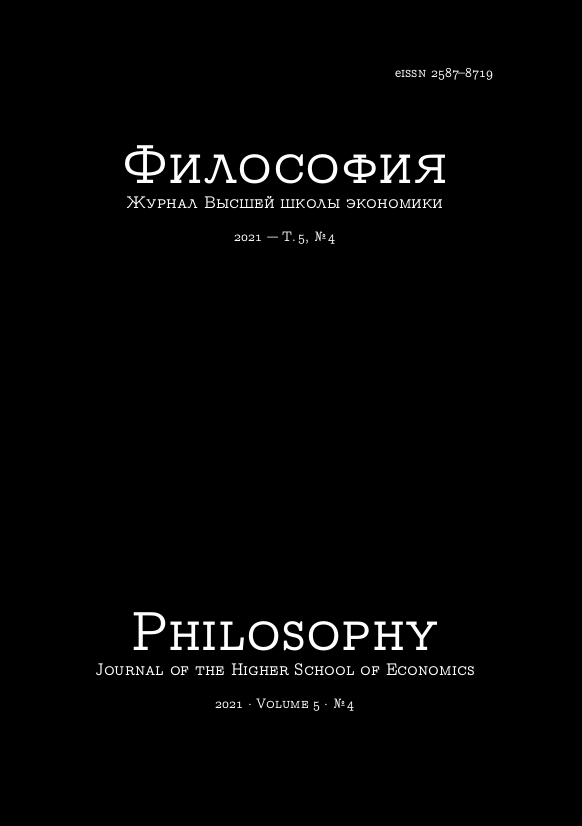 Philosophy of Science in Social and Political Contexts
Vol 5 No 4 (2021)
Philosophy of Science in Social and Political Contexts
Vol 5 No 4 (2021)Philosophy of science is often seen as complex interdisciplinary research of science as a complex object in the variety of its sides and facets. Why is this complex included in the composition of philosophical disciplines and directions? This question is not trivial. It touches the sensitive nerve of modern philosophy as such: is it destined to preserve and strengthen its disciplinary status or to dissolve in a multitude of special sciences as an ideological and methodological appendage-commentary to their results?
This issue should be discussed and resolved not by abstract reasoning but by studying the objective process of the interdependent development of science and philosophy. The reflection of this process has long been the prerogative of the latter. Modernity adds confidence that this is not a reflection of an outside observer and critic but a participant in a joint movement. Each new step depends on common efforts. Science is becoming more and more philosophized, and philosophy is "scientified" (I beg your pardon for the clumsiness of these terms). Old disputes about the necessity or possibility of the so-called demarcation between philosophical and scientific knowledge, between the activities of a philosopher and a scientist, for the most part, have long gone into history.
The main body of articles in this issue is devoted to issues at the intersection of philosophical and scientific discourses. The primary attention is paid to the connection between the philosophical and historical analysis of science and the problems that arise when discussing the political subjectivity of science.
Igor Dmitriyev raises in his article a rather unexpected question for the philosophy of science about what role the discussion of the theological theme of the Miracle played in the formation of modern science. Neither the philosophy nor the science of modern times was separated by the “Chinese wall” from theology. Scientific problems crystallized in polemical contact with theological, and it happened that the most critical concepts of new science (such as "universal gravitation" and actio in distans in Newton) were formed as results of mutual diffusion of meanings between these spheres of Ratio. Science tried to assimilate the idea of a "miracle", using it as an element of natural philosophy: God appeared in the scientific mirror of nature as a wise coordinator of the actions of his laws.
Nataliya Kuznetsova examines the descriptive function of historical epistemology in the context of the interests of the philosophy of science. Applying the method of discourse analysis in historical and scientific research, one can come to significant epistemological conclusions: the history of science is not only a story about a change in scientific paradigms and interpretations of experiments. It is also an elucidation of the personal identity of a scientist, his cultural codes, which are essential for understanding the stimuli of his actions and a scale for assessing their results. In historical epistemology, there is a growing interest in contingency as a factor in forming research tracks.
Vladimir Porus and Valentin Bazhanov reveal the connection between the epistemological status of the so-called postnormal science (Funtowicz, Ravetz) and the problem of the political subjectivity of science. Acquisition or loss by the science of status of a political subject depends on the nature of the political environment in society. If the political climate is only an imitation, political subjectivity is not the goal and value of science. There are only a few changes here if science takes on a "post-normal" character. For the pursuit of political subjectivity in science to become the norm, science must participate in the movement towards a democratic civil society.
Vladimir Porus and Valentin Bazhanov's article is discussed by Svetlana Shibarshina, Yevgeniy Maslanov, Liana Tukhvatulina and Yevgeniy Zharkov. The authors have noted a multiplicity of factors affecting the blurring of the boundaries between scientific research and its political consequences. The context in which contact between scientific teams, individual actors and the political environment is expanding and becoming more complex. In particular, in the political interactions of scientists with other political actors, people who are not included in the scientific community participate in the role of mediators (Shibarshina). We can talk about the political subjectivity of science in the sense that science is an essential element of managerial and political practices. Scientific theories and technologies, acting as representatives of non-human actors, change the idea of “Nature”, which appears like a stage for political actions and a factor in their transformation, which can be considered an element of political subjectivity (Maslanov). In specific political laboratories, the concepts of "scientific" and "political" are mixed, which, among other things, is fraught with the loss of the moral guidelines of science (Zharkov). The political subjectivity of science is fraught with several threats for science itself and society. First of all, it is the threat of political control over the activities of scientists. It also includes the negative impact of the political selection of scientific expertise. Such threats can be either neutralized or eliminated through the optimal new differentiation of expertise by expanding the circle of experts per the political needs of society.
Anastasiya Ugleva states that trust in authority in science and in those types of practice in which there is a large share of scientific knowledge plays a crucial role in making significant decisions. The very same authority arises and is strengthened due to the recognition of a particular scientist (scientific team) adherence to the so-called "intellectual virtues", that is, the central epistemic values, as guidelines for research activities. This trust plays a unique role when the specificity of practical activity lies in the lack or absence of opportunities for the experiment (for example, in medicine).
In the rubrics adjoining the issue's main topic, articles on a wide range of philosophical problems are proposed. Svetlana Neretina continues the discussion around the philosophical aspects of Fyodor Dostoevsky's work, initiated by the anniversary of the writer. Dostoevsky created in the story “Bobok” a special optics that allows one to see the process of "reflection in reflection", that is, self-understanding through observation of oneself in a borderline situation. The possibility there is not separated from reality by a rigid border, but, on the contrary, they coexist and mutually "flow" one to the other. Neretina supposes that Dostoevsky seemed to foresee some essential features of literature and the philosophy of science of the 20th century.
In their article, Olga Bychkova and Artyom Kosmarski analyze the political genealogy of one of the most promising and influential information technologies of our time - blockchain (or distributed ledger). They point to significant similarities between how blockchain projects work and models of republican governance. From a methodological point of view, the authors primarily refer to classical republicanism and the actor-network theory developed by Bruno Latour and others.
I. Shablinskiy concludes that the correlation of political sovereignty and the general foundations of the theory of democracy can be viewed through the optics of federal politics proposed by J.-J. Rousseau. This model assumes the coexistence of many centres of collective decision-making within one polity.
According to the established tradition, this journal issue publishes a translation of one of the classical philosophical texts with a scientific commentary from the translator. This time it contains a translation of a part of the metaphysical treatise of the Catalan follower of Duns Scotus Peter Thomae “On the types of distinctions” (1325), made by Vitaly Ivanov. This publication will attract the attention of Russian medievalists, logicians, historians of philosophy and culture.
This issue publishes critical bibliographic materials: a review by Sonia Porfirieva on the book Y. Strengers, J. Kennedy “The Smart Wife: Why Siri, Alexa and other Smart Home Devises Need a Feminist Reboot” (Cambridge, 2020), Anna Winckelmann on Robert Darnton's book “Mesmerism and the End of the Enlightenment in France” (Moscow, 2021). Alexander Markov for A. Safronov's book “Causal dualism” (M., 2021), Nikolay Afanasov for the book by Jean-Pierre Dupuis “Sign of the Sacred” (M. 2021 ).
The team that worked on the issue wishes the readers a pleasant and helpful study of the presented materials.
Vladimir Porus
-
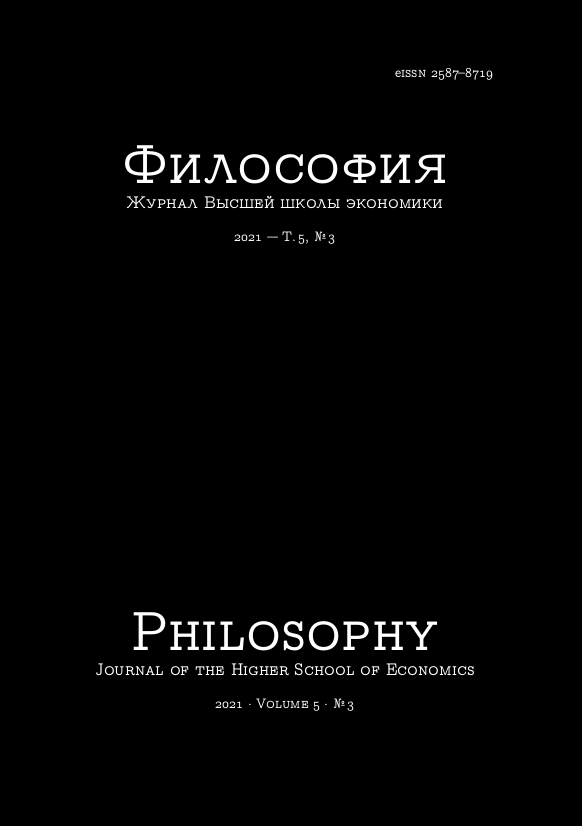 Dostoevsky’s 200th Anniversary
Vol 5 No 3 (2021)
Dostoevsky’s 200th Anniversary
Vol 5 No 3 (2021)The reason to turn again to the work of F.M. Dostoevsky's - his 200th anniversary - is both unique and ordinary. Unique, because such an important date in itself obliges a lot. Ordinary - because even without jubilee occasions, turning to the texts of the great writer has long become commonplace for any thinking researcher. Moreover, nevertheless, realizing both circumstances, the authors of the jubilee issue took the liberty, if not to try to find something little spoken in connection with Dostoevsky, then nevertheless speak out taking into account the height of the years passed after his life.
The first article is written by Denis Berezhnov, a postgraduate student at Moscow State University. It is dedicated to the aesthetic-utilitarian debate developed by Dostoevsky in The Demons, which has become especially relevant for our time. The following two articles - by Sergei Nikolsky (Institute of Philosophy RAS) and Grigory Tulchinsky (National Research University Higher School of Economics, St. Petersburg) directly correlate the writer's thoughts with problems significant for the Soviet era. The first article - through the study of temporal existential meanings; the second - through the analysis of the consequences of implementing the program of social reorganization. Continues the issue the article by Vladimir Katasonov (Saint Cyril and Methodius Institute for Advanced Studies) dedicated to the relationship between Dostoevsky and phenomenology. The following three articles are devoted to the peculiarities of previously little-studied aspects of Dostoevsky's works' philosophical and artistic content. Nikolai Murzin (Institute of Philosophy, RAS) analyses the phenomenon of misfortune. Ksenia Koroleva, a postgraduate student at the Institute of Philosophy of the Russian Academy of Sciences, studies the phenomenon of gambling basing on Dostoevsky's novel The Gambler. Yulia Erokhina (NRU Higher School of Economics) attempts to simulate the image of the pale world as seen in the novel Crime and Punishment. According to Denis Kacheev (Kostanai Branch of Chelyabinsk State University) and Sergey Kolchigin (Institute of Philosophy, Political Science and Religious Studies of Committee Science of the Ministry of Education and Science of Kazakhstan), Dostoevsky was one of those who began a spiritual quest in Russian philosophical thought. In the final article of Dostoevsky's section, Inna Tiguntsova (University of Toronto, Canada) attempted to compare his work with other writers. In her article, she compares the images of birds in Dostoevsky's novels "Poor People" and "The Sorrows of Young Werther" by Goethe.
The rest of the Studies' section consists of the articles by Andrey Teslya (Institute of History St. Petersburg University; Immanuel Kant Baltic Federal University) "The Slavophiles and the" Polish Question "in 1840 - the 1st half of the 1860s" and Anton Borovikov (RANEPA, EU at St. Petersburg) "Materialistic Modernization of Russian romantic nationalism. According to the notes "On the mutual relationship of the people, state and society" by Ivan Aksakov (1862)".
The issue also contains a translation into Russian of Skinner, Valsiner and Holland's article "Discerning the Dialogical Self: A Theoretical and Methodological Examination of a Nepali Adolescent's Narrative". The translation was done by Diana Gasparyan (NRU HSE).
The book reviews' section includes the reviews: by Artyom Morozov (Institute of Philosophy RAS) on the Russian translation of Steve Fuller's "Post-Truth: Knowledge as a Power-Game"; by Dmitry Davydov (Institute of Philosophy and Law of the Russian Academy of Sciences (Yekaterinburg) on the Russian version of D. Harvey's "The Condition of Postmodernity"; by Alexander Markov (RSSU) on Alexander Montlevich's Wakefulness Madness: Speculative Realism and Lucid Dreaming; and by Alexander Pavlov (Institute of Philosophy RAS) on the Russian version of Bernard Perron's Silent Hill. The Terror Engine.
S. Nickolsky -
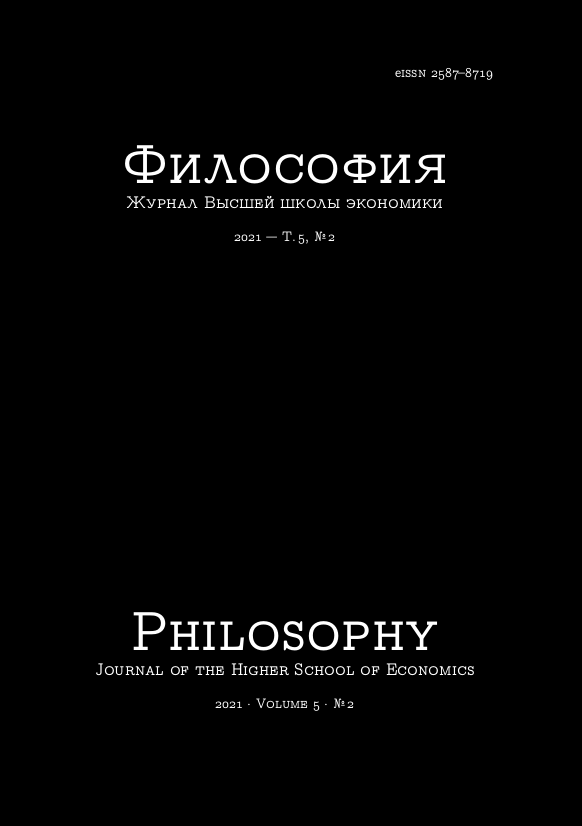 Right to Left, Left to Right: Conservatism and Radicalism in Their Interconnection
Vol 5 No 2 (2021)
Right to Left, Left to Right: Conservatism and Radicalism in Their Interconnection
Vol 5 No 2 (2021)The focus of the new issue of our journal is the political philosophy of conservative and radical trends. First of all, in those moments where conservative thought merges with left-wing constructions and vice versa, where the political thought of radicals/socialists turns out to be absorbing concepts and pieces of training of thought, genealogically or actually at that moment belonging to the circle of conservative ideas.
We tried to combine theoretical and concrete historical research since, in our opinion, there is ample space in the history of thought and intellectual history that is not only theoretically not fully comprehensible, but also primarily elementary, not described. The issue opens with an article by Ilya Budraitskis (RANEPA) dedicated to understanding / conceptualizing the finitude of the state in conservative and socialist thought. The following five articles analyze different aspects of the history of Russian thought. Konstantin Dushenko (INION RAS) reconstructs the history of the myth about the “end of Petersburg”. At the same time, Andrey Teslya (IKBFU) analyzes the formation of the concept of “subjective sociology” by Nikolai Mikhailovsky and the difference between “spirit” Russian radicalism of the sixties and seventies. Evgeniy Emelyanov (Ural Federal University named after B.N. Yeltsin) addresses the insufficiently studied issue of the influence of the famous polemics of E. Meyer and K. Bücher on Russian and Soviet historical science, German Korayev (IKBFU named after I. Kant) analyzes Bakhtin's theory of carnival through the prism of biopolitics, and Anatoliy Korchinskiy (Russian State Humanitarian University) examines the relationship between text and reality in Soviet “sociological” literary criticism of the 1920s. The last two articles written by Alexey Kruglov (Russian State University for the Humanities) and Yuriy Vasilenko (NRU HSE-Perm) refer to foreign subjects. The first article demonstrates the importance of commemorative and commemorative philosophical medals as unique visual means for clarifying problematic issues in the history of philosophy. Yuri Vasilenko's article analyzes the attempt by Juan III, a Carlist claimant to the Spanish throne in 1861--1868, to expand the ideological base of Carlism to moderate liberalism. The author highlights the problems and contradictions of the initially anti-modernist, conservative position of the Carlist core in the rapidly changing social and political realities of the 3rd quarter of the 19th century.
The translation section consists of two materials: the report “On the destruction caused by vandalism and the means to curb them” by Henri Grégoire (in which the concept of “vandalism” is introduced), translated and commented on by Evgeniy Blinov (Tyumen State University), and the “Famine, Affluence and Morality” by Peter Singer, accompanied by a detailed introductory article by translators Anna Vernikovskaya (independent researcher) and Alexei Pleshkov (HSE University).
The issue closes with the reviews section, which includes three texts. First of them is the critical analysis of “The Political Doctrine of Julius Evola in the Context of the 'Conservative Revolution' in Germany” by Dmitriy Moiseyev (Oleg Kildyushov, NRU HSE). The second is the review of the Ukrainian version of the “Dictionary of Untranslatables: A Philosophical Lexicon” written by Alexander Markov (Russian State University for the Humanities). Finally, the third one is the review of “Post-Horror” by David Church (Alexander Pavlov, Higher School of Economics).
A.A. Teslya
-
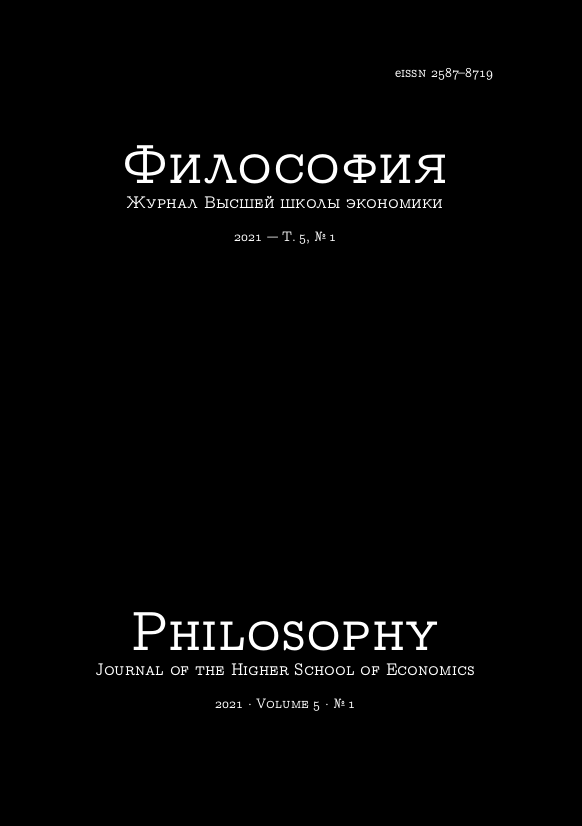 The Philosophy of Vladimir Bibikhin
Vol 5 No 1 (2021)
The Philosophy of Vladimir Bibikhin
Vol 5 No 1 (2021)The current issue dedicated to Vladimir Bibikhin (1938-2004) is a result of the International Vladimir Bibikhin Conference (Bibikhin Readings), which has been held since 2019 in the birthplace of the thinker and translator in Bezhetsk (Tver region). Famous philosophers and philologists from Moscow, St. Petersburg, Kazan, Saratov and Kiev took part in this event. The authors of the issue focus on the central themes of Bibikhin's philosophy — energy, the event of the world, captureness, automaton, sophia, the other beginning.
In his philosophical constructions, Vladimir Bibikhin in particular relies on the heritage of Greek philosophy. That is why we decided to open the issue with two articles on ancient ethics. Irina Makarova, in her article "Piety: the Lost virtue of Aristotle?", delves into the ethical treatises of Aristotle in order to find traces of "lost" piety (hosiotēs) among the ethical and dianoetic virtues. Aleksey Pavlov's article "The 'Analytical' branch of modern stoicism: L. Becker, W. Irwin, M. Piliucci" highlights the work of three ideological leaders of this direction, explaining the relevance of stoic ethics for a 20th century man.
When the issue was being prepared, the sad news came about the sudden death of one of the initiators and inspirers of the Bezhetsk Readings, an outstanding mathematician and physicist, philosopher, theologian and translator Sergey Khoruzhiy (1941-2020). He remained Bibikhin's intellectual sparring partner for several decades. Therefore, the issue opens with two articles about the "polemical friendship" of the two philosophers.
In his article "Synergy Polemis" Anatoliy Akhutin masterfully introduces the ontological aporetics of European thought, from which one of the most vivid discussions of modern Russian philosophy, reminiscent of the Byzantine disputes of the XIV century, has grown. Yuriy Romanenko reveals the "The Eventful Character of Vladimir Bibikhin’s Philosophical Thought" in a historical review of its academic reception over the past decade. The author also focuses on ontological topics and, analyzing in detail the concepts of “paradox” and “change of aspect”, alternately shows the repulsions and convergence between the thought of Bibikhin and the thought of Wittgenstein, Heidegger, Losev, Pyatigorsky, Akhutin.
The second part of the research is a series of hermeneutical interpretations of Bibikhin's philosophy. Mikhail Bogatov in the article "Thematization of Lecture Courses: Vladimir Bibikhin’s Strategies of Thought" reminds us that all of Bibikhin's most famous books are his lecture courses given at Moscow State University, the St. Thomas Institute, the St. Philaret Institute, and Institute of Philosophy (Russian Academy of Science). The author suggests paying attention to the non-standard composition of even the most "traditional" courses (such as "Philosophy of Law" and "History of Modern Philosophy"). He identifies here specific "expedients" (ways of thinking) that serve to form the subject field of the lecture course, and comes to an important heuristic conclusion: "Any formalization of Bibikhin's thought that does not capture the specifics of the hermeneutic situation will always turn out to be conditional and ineffective."
Other articles in this section demonstrate to a certain extent the fidelity to this principle of reading. Aleksey Babanov in the article “The Correlation Between Ontology and Ethics in Vladimir Bibikhin’s Philosophy: Automatic Morality” works with the courses "The Pravda" ("Ontological Foundations of Ethics") and "The Woods". He finds the answer in the paradoxical concept of "automatic morality", which is used to solve the problem of conscious or unconscious choice. Kate Khan in her research addresses the phenomenology of the mood of historical time in V. Bibikhin and P. Ricoer, justifying this convergence with a common intellectual context (Aristotle, Augustine, Heidegger). Yelena Smirennikova examines a fragment of the first lecture course "The World" (1988/89), where eternity is interpreted as a "young-new", a constant renewal that manifests itself in the event, in the present.
“An interview with Sergey Khoruzhiy on the History and Current State of Russian Religious Thought” is first published in Russian. The conversation initiated by Kristina Stoeckl and Alexander Mikhailovsky in the spring of 2015 and held at the Institute of Human Sciences (Vienna) in English reveals many interesting facts and casts a new light on the intellectual history of the late Soviet and post-Soviet period.
In the section "Publications and Translations" there are two interesting texts. The first is a previously unpublished lecture by Vladimir Bibikhin from the course on Wittgenstein's philosophy of the 2002/2003 academic year, transcribed and presented by Vasilina Yarovova. The second is the little-known work of Max Scheler “On Eastern and Western Christianity” (Über östliches und westliches Christentum), first published in 1916 and most recently translated into Russian by A. N. Malinkin. The article by Alexander Mikhailovsky introduces Scheler into the context of the "military philosophy" and emphasizes the importance of F. M. Dostoevsky for the perception of Russia by German intellectuals in the first quarter of the 20th century.
The review section contains three articles. Vladimir Bliznekov's review critically examines the publication of the first translation of Bibikhin's essays into German under the title Der andere Anfang (2020). And two other texts are devoted to the discussion of the publications of the staff of the School of Philosophy and Cultural Studies: Alexander Markov chose for his analysis the work of G. I. Chernavin on phenomenological demonology The Philosophy of the Troll (2021), and Svetlana Neretina draws the attention of readers to the first book of the young researcher A. K. Kulikov Mythological Motifs in the Works of N. V. Gogol.
The issue concludes with a detailed review of the Second Bibikhin Readings in Bezhetsk (December 2020), prepared by the active participants of the conference – Kate Khan and Anastasiya Tomashevskaya.
Alexander Mikhaylovskiy
-
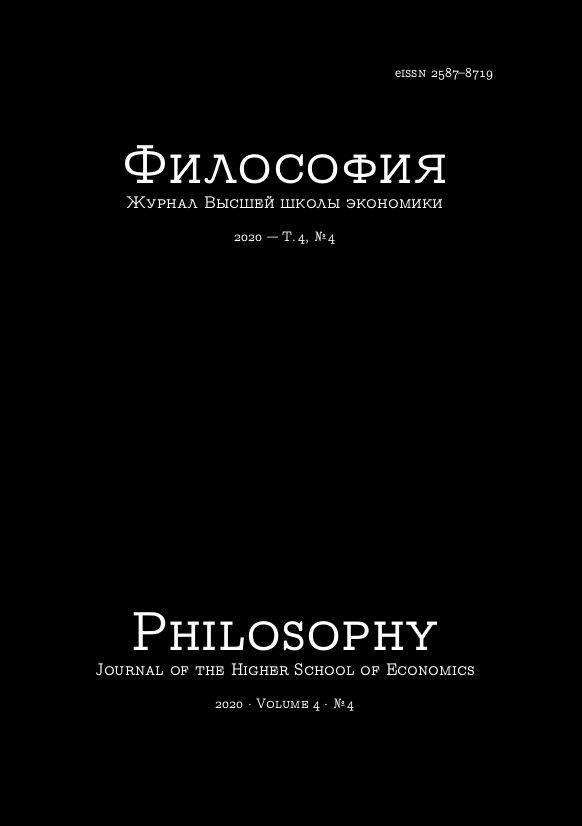 Limits of Knowledge
Vol 4 No 4 (2020)
Limits of Knowledge
Vol 4 No 4 (2020)The editors were inspired to create this issue by a discussion that took place in the framework of the round table "Limits of Knowledge " under the auspices of the Institute of physics of the Russian Academy of Sciences and the HSE school of philosophy in autumn 2019. Although such a topic opens up an extremely wide field for research, the issue was formed around the problems of the philosophy of religion.
There are two articles in the Studies.
In Evil and Free Will Igor Gasparov offers a deep, as is always his way, and thorough analysis of the problem of evil in modern analytical philosophy. The main objects of research are the approaches of two "pillars" of the analytical philosophy of religion – Alvin Plantinga and Richard Swinburne. The non-trivial and elegant solution to the paradox of the coexistence of evil and an omnipotent being will surely wonder you.
Yevgenia Vilkova's article American Theodicy: The Content and Distinctive Features of the Apologia of David Bentley Hart is also devoted to the problem of theodicy, as well as the previous one. However, unlike the previous author, she focused on a detailed analysis of the orthodox American theologian D. B. Hart, little known to the Russian philosophical community. The article will be of interest to all those who are interested in the problem of evil and omnipotence, as well as in the analytical philosophy of religion.
We are glad and proud to present you the second panel discussion in the framework of analytical philosophy – a genre that is unfairly little spread in the Russian-speaking philosophical environment. This time, the initiator was Pavel Butakov with the provocative text How to Believe Faithfully and Firmly? Pavel himself offers a very non-trivial answer to this question. In addition, very bright and very various Russian philosophers tried to give their answers to the same question:
- Konstantin Pavlov-Pinus in a rather harsh text Оn the Benefits and Harms of Analytical Philosophy for Non-scientific Theorizing seriously criticizes some of the provisions of Pavel Butakov;
- Alexey Rakhmanin in the answer entitled Firm Faith: Desire and the Price of Mistake as a true philosopher falls into amazement, in order to find a clear path of reasoning;
- Basil Lurie in his answer to the question How to believe? carefully and thoroughly analyzes the question posed by Pavel;
- Anna Moiseeva in her answer Epistemology and Practice of Faith with academic fervor tries to understand the most subtle nuances of the approach proposed by Pavel Butakov.
And, of course, at the end of the discussion, Pavel Butakov offers his view on objections and comments of colleagues. His answer is entitled What to Believe and How to Believe It: A Response to My Interlocutors.
In the section Translations and Critical Editions, two very prominent philosophical texts are offered to your attention at once, each of which is accompanied by an interesting introductory article from the author of the translation.
Matvey Sysoev presents an article by William James How two minds can know One Thing? (1905), and Elena Kosilova presents an article by Thomas Nagel Absurd (1971).
The Philosophical Criticism section this time contains more of an independent study than just a review by Professor N. V. Motroshilova The Last Interview and a New Book by Jürgen Habermas: “No One and Nothing worth Remembering should not be forgotten in a Modern History of Philosophy”. Habermas' interview is related to the topic that has changed our lives and our world rapidly and radically — with the coronavirus. Prof. Motroshilova analyzes this interview from a philosophical point of view and gives her expert assessment. The second part of the work will deal with a new reading of the history of philosophy in general and the philosophy of Kant — in particular. What does Habermas offer and how does it relate to the current agenda? Prof. Motroshilova gives detailed analyses of it.
Alexey Gaginsky and Yulia Gorbatova
***
The section "History Method / History of the Method" presents articles that reveal the method of historical knowledge from different angles, including in historical retrospect. P. Y. Rakitin in the article traces the intellectual search of the American thinker R. W. Emerson (1803-1882), the formation of his historical concept, the place of history in his moral philosophy of transcendentalism is revealed. L. B. Sukina analyzes the experience of working with visual sources, which is particularly relevant in the situation of a visual turn, overcoming the traditional limitation of historical research by written sources; the author traces in comparison two historiographical traditions — the Western one (E. Panofsky, E. Gombrich) and Russian (from M. N. Tikhomirov and V. A. Plugin to M. Yu. Lotman and B. A. Uspensky). L. N. Mazur shows the historical modeling perspectives in a broad historiographical context; is a relatively new and undoubtedly promising method of history as rigorous science. -
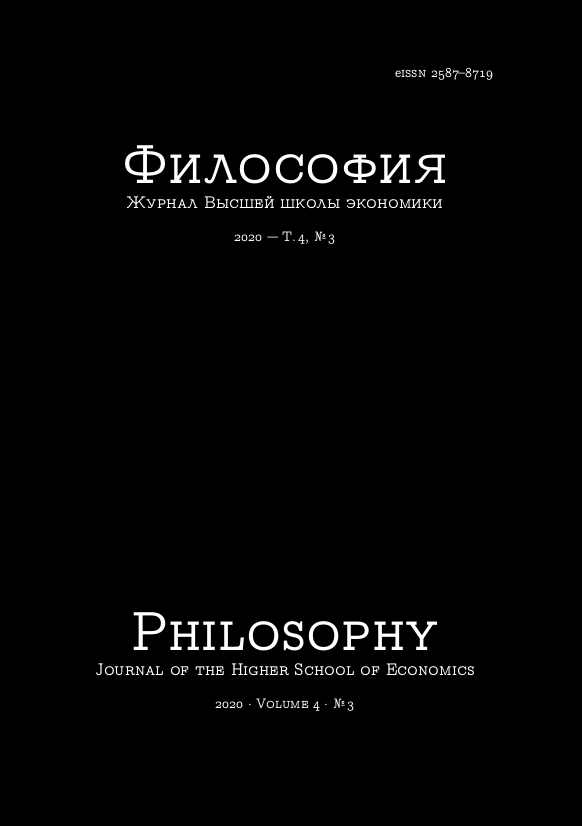 Methods of Historical Cognition
Vol 4 No 3 (2020)
Methods of Historical Cognition
Vol 4 No 3 (2020)The opening article by Yu. V. Ivanova and P. V. Sokolov analyzes the strategies of reception of early Modern humanitarian epistemology focused on the legacy of Giambattista Vico: absolute historicism by Benedetto Croce and modal rhetoric by Nancy S. Struver. This topic is Complemented by the review of the international conference Guicciardini and Machiavelli at the origins of Modern historical science(September 23-25, 2019, Moscow), made by N. A. Kochekovskaya.
I. Kazankov and O. L. Leibovich return to the questions of whether there are special methods of historical research and how the Historical method is possible. In a polemical article written in the format of a dialogue, they examine the process of changing paradigms of historical knowledge — from positivism to postpositivism — focusing on the legacy of positivism in Marxist historiography of both the pre-revolutionary and Soviet periods. The deconstruction of the discussed approach based on the post-positivist concept of Paul Feyerabend gives special interest to their dialogue.
M. Rutkevich shows that the legacy of historicism today is not the assertion of a special method, but skepticism and realism, understood, of course, not as metaphysical doctrines. Choosing a term from metaphysics, he dubbed the prevailing mode of modern historical research hypothetical realism.
This section ends with an article by Rolf Toshtendahl, who examines the concepts of the theory of history and the production of historical knowledge by six theoretical historians of the last third of the XX and early XXI centuries: A. R. Louch, Marek Tamm, Herman Paul, Chris Lorenz, Gabrielle Spiegel, and Hayden White.
Further, in the articles by V. N. Syrov and I. E. Rudkovskaya, the problems of applying narratology to historical knowledge and the temporal canon of narratives are developed, respectively. The effectiveness of the use of temporal markers is demonstrated by I. E. Rudkovskaya on the example of the analysis of the works of N. A. Polevoy.
Translations presents a lecture prepared for publication by A. V. Marey and Y. V. Vasilenko by Juan Donoso Cortés On the sovereignty of reason considered in relation to history, which continues the publication of a series of lectures delivered by the Spanish thinker in Madrid in 1836-1837.
The section Criticism contains reviews of two current works on intellectual history: review by B. A. Belyavsky on the Cambridge school: theory and practice of intellectual history, dedicated to the history of concepts, which also acts as an effective method of historical science, and review by I. O. Dementiev on the S. L. Kozlov’s book Implantation: essays on the genealogy of historical and philological knowledge in France, which focuses on the struggle since the 1860s.
Irina Savelieva and Marina Rumyantseva
-
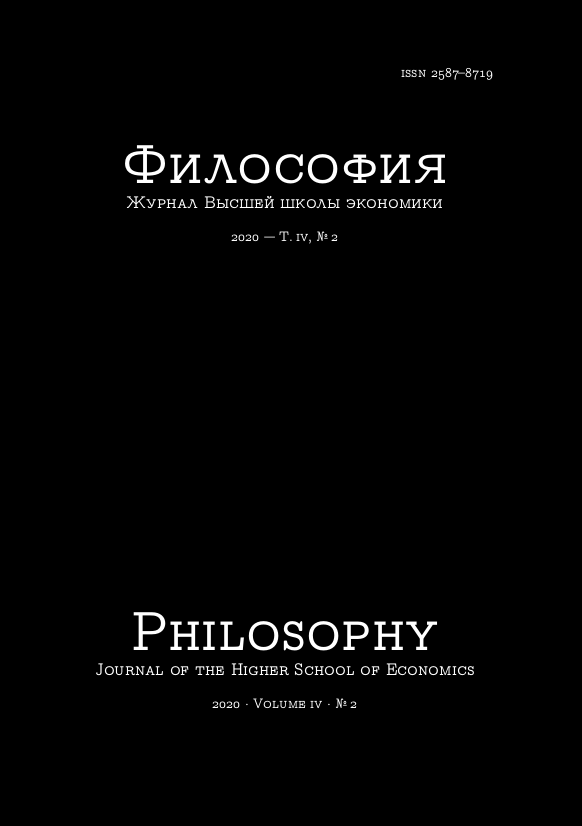 Places and Models of Existence of Russian Philosophy
Vol 4 No 2 (2020)
Places and Models of Existence of Russian Philosophy
Vol 4 No 2 (2020)The section dedicated to the memory of Mikhail Gefter opens with a series of interviews with his students and relatives — Gleb Pavlovskiy, Mikhail Rozhanskiy, Claudio Ingerflom, Valentin Gefter, and Vyacheslav Igrunov. Of additional interest are photographic materials, most of which are kindly provided for publication by the heirs of Michael Gefter. As a supplement to the interview with Gleb Pavlovsky, we publish Chapter 1 of his forthcoming book, «The Weaks», containing fragments of Gleb Pavlovsky's conversations with Mikhail Gefter and the comments of the former.
Two articles continue Gefter’s line of thought — Gleb Pavlovskiy's and Konstantin Gaaze's research on the reconstruction of the Gefter's theory of the event and Viktoriya Faybyshenko's article analyzing the peculiarities of functioning and problematization of the ideological discourse in the reflection of late Soviet philosophers, first of all, Mikhail Gefter, Ewald Ilyenkov, and Mikhail Lifshits.
The second section is devoted to the concepts of (self-)description of the history of Russian thought and opens with an article by Fedor Gayda analyzing the process of emergence and design of the concept of «intelligentsia» in Russia. Aleksey Panchenko's work is devoted to the peculiarities of knowledge production by «Narodniks» in the 1870s–90s and to the identification of common features of the intellectual evolution of Narodniks-ethnographers. Andrey Teslya's article considers the evolution of interpretations of the philosophical heritage of A.I. Herzen in the works of G.V. Florovsky in the 1920s — first half of the 1930s and the reflection of the conceptual scheme he developed in «The Ways of Russian Theology». The concluding article by Tat’yana Rezvykh and Gennadiy Alyayev analyses the ontology and gnoseology of Ludwig Binswanger in the context of the concepts of Semyon Frank and Martin Heidegger.
Andrey Teslya
-
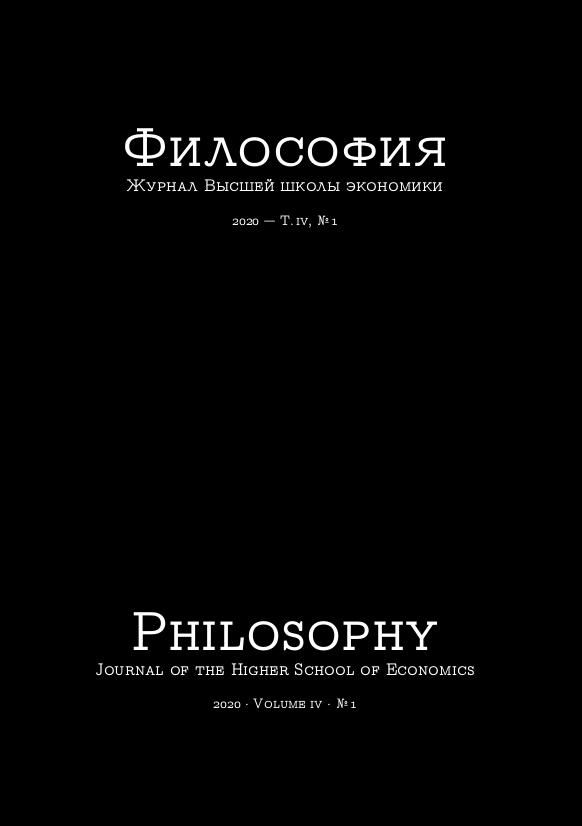 Neuroethics
Vol 4 No 1 (2020)
Neuroethics
Vol 4 No 1 (2020)This thematic issue of the journal was conceived as a platform for a dialogue between philosophers, natural scientists and practitioners about the nature of neuroethics — a discipline that is still not well — established in Russia, but is increasingly attracting attention as an interdisciplinary. Not by chance the result announced at the beginning of the XXI century the European Union and North America large-scale programmes of studies of the brain, several new scientific disciplines — for example, neuroeconomics, neuropsychology, neurophilosophy, neuropsychology, neurotheology in which the philosophical view on the investigated issue is no less important than natural science study and develop a common scientific language becomes almost a condition for their success. The emergence of such disciplines at the intersection of various cognitive and social Sciences is evidence of another "naturalistic" turn in the Humanities and at the same time understanding the importance of ethical expertise of natural science research.
The section "Research" of this issue opens with an article by R. G. Apresyan, where the author formulates "challenges" for modern philosophy and neuroscience, which required, on the one hand, the awareness of philosophers of the need to revise ethical and philosophical concepts for the development of moral theory by the current development of science; and, on the other hand, overcoming unjustified skepticism of scientists regarding the effectiveness of their use of existing ethical concepts, which is a consequence, as a rule, of their "ordinary" understanding of morality. Further in the article D. I. Dubrovskiy reveals the content of various most significant areas of research in neuroethics — from Brain Reading to free will —which allows us to see in it the most important element of modern neuroscience.
T. Khamdamov's article analyzes specific examples of Human Brain Projects, in which the functioning of complex multi-factor models of the brain and nervous system is provided by large computing capacities of software and hardware complexes in the course of computer simulations of neurophysiological, neurobiological and neuropsychological processes of a living organism. This section ends with an article by Yu. Yu. Petrunin, which presents the results of his scientometric analysis of the database of publications of Russian scientists on neuroethics in the RSCI and foreign databases MND and WoS, which allows us to judge the specifics of the institutionalization of neuroethics in Russia.The "Discussions" section presents the materials of the round table "Current problems of neuroethics", held on 30.10.2019 with the joint participation of the HSE and NSMII RAS. Next — a detailed discussion of our colleagues from Belarus about the prospects for "human improvement" in the framework of psycho-neuro-genetics as a result of manipulations with genes and the introduction of NBIС-technologies.
The section "Reviews and reviews" contains a review article by M. V. Fedorova, which analyzes the most cited Western publications on neuroethics over the past few years. The following three polemical texts are presented: a review by K. K. Martynov of B. G. Yudin's book "Man: going beyond" (2018), a review by G. A. Chasovskikh of R. Sapolsky's book "Biology of good and evil: how science explains our actions" (2017), and a review by A. A. Teslya of S. L. Chernov's book "Casus of Vladimir Pecherin" (2016).
Finally, in the section "Archive of philosophical thought. Translations" we bring to your attention a commented translation of Giannozzo Manetti's the Lives of Socrates and Seneca, by E. R. Andreeva and R. L. Shmarakov.
Anastasia Ugleva
-
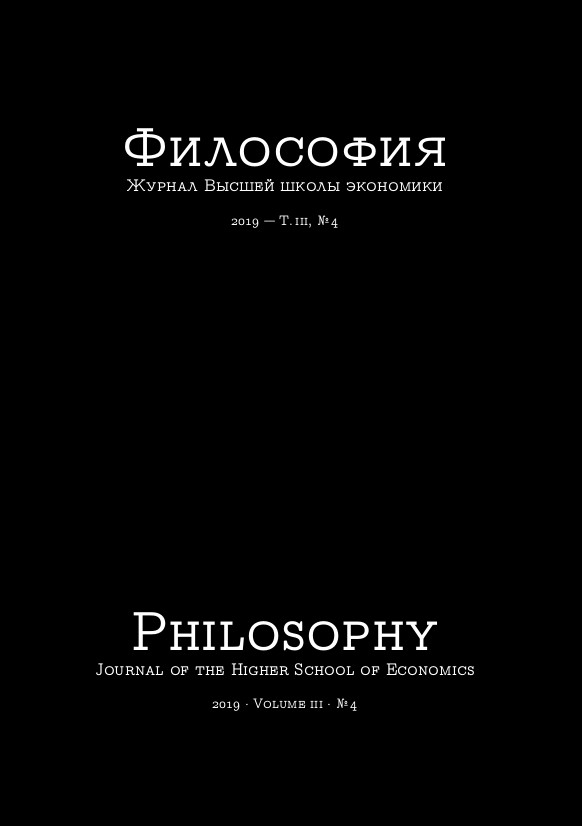 Nature of Law and Law(s) of Nature
Vol 3 No 4 (2019)
Nature of Law and Law(s) of Nature
Vol 3 No 4 (2019)The concept of law became the cornerstone of the European intellectual tradition since the Enlightenment of 18 c. Apart from the legal rules, the laws stricto sensu, laws of nature followed by linguistic norms came into focus right up to the laws regulating norms for violating laws. Therefore, the law concept reflection becomes a necessary element for every discourse which pretends to be philosophical or philosophical-historical as well.
Five of six articles constituting the "Studies" sections are devoted to the attempts for understanding the concept of "law" in three possible perspectives. In the opening article, Rodger Smith (IPh RAS) analyses the vision of laws of human nature in the French Enlightenment ideology (G. B. de Mably) and the impact of this position to the later European philosophy until the contemporary neuroscience and particularly neuroethics (the first issue of the journal in the 2020 year will be devoted to the problems of neuroethics). The following article by f. George Orekhanov (Saint Tikhon’s Orthodox University of the Humanities) is focused on the problem of F. M. Dostoevsky’s and L. N. Tolstoy’s reception of atheistic and anthropological views of L. von Feuerbach. The author emphasises the inner inconsistency in Feuerbach’s points, especially stressing the fact that Feuerbach did not take into account the irrational nature of evil in humans. The two following articles by S. Zenkin (RSUH; NRU HSE, SPb) and Ye. Velmezova (Lozanna University) lay emphasis on the laws of language, though from different angles. Sergey Zenkin is interested in “the laws of transgression”, that is, “legitimate exceptions and violations” as reflected in language, particularly in fiction. Treating the problem in a more historical and not philosophical way, Yekaterina Velmezova analyses the famous linguistical discussion of the 1950s and interprets it as a dispute between Marr the academic and I. V. Stalin on laws. This problematic section is closed by the article by I. Svetlikova (NRU HSE, SPb) in joint authorship with two of her students, N. Kalinovskiy and M. Fesenko. Referring to V. V. Rozanov’s works, the authors explore the views of positivists of the beginning of the 20th c. on astronomy and astrology as sciences of human development.
The article by N. A. Kanayeva stands on its own in the same section. It is devoted to one of the controversial questions of Indian philosophy — the essence of Jain nayas.
In the “Translations and Publications” section the real crown jewel is published. It is the new translation of “The Consolation of Philosophy” into Russian. The translation was carried out by R. L. Shmarakov as well as the commentary.
Finally, the reviews section includes the Mikhail Nemtsev’s review of the recently published book by Yuriy Pushaev on the history of Soviet philosophy.
A. M.
-
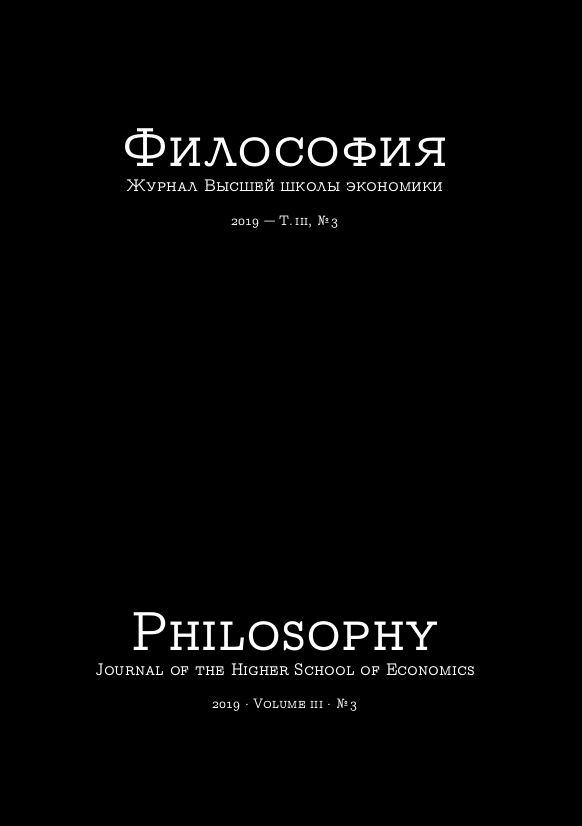 Ethics of Belief
Vol 3 No 3 (2019)
Ethics of Belief
Vol 3 No 3 (2019)The expression “Ethics of belief” is still unusual for Russian readers. While in the West, many spears have been broken in disputes regarding evidentialism, fideism, reliabilism, and other epistemological concepts, in Russian philosophy these problems are only just beginning to be discussed. Of course, experts are well aware of what is at stake, but at present time there are no translations of basic texts in Russian or relevant studies, and it causes a whole range of problems in education and understanding of modern epistemology in general. To fill this gap is called upon the present issue of the journal.
This is the first issue of a Russian-language journal entirely devoted to the ethics of belief — this topic has not yet been discussed in Russian philosophy. Given this circumstance, the issue is constructed in a way to provide a sufficiently complete picture of the topic, starting with the famous article by W. Clifford “Ethics of belief” (1877). A new Russian translation was made for this issue (by B.V. Faul and Y.V. Gorbatova) and an extensive introductory article on the history of the emergence and development of the ethics of belief as a special direction in epistemology was added.
The research section includes eight articles that in one way or another consider the topic of the issue.
The first is an article by Andrei Zheleznov, in which “belief” is considered as the basis for a moral lifestyle. An article by Alexei Gaginsky is devoted to the analysis of the fundamental difference between the “beliefs” of evidentialists and religious faith. Rob Lovering’s article provides a critical analysis of Clifford’s famous thesis: it is wrong always, everywhere, and for anyone to believe anything upon insufficient evidence. Further, the article by Yulia Gorbatova discusses a very specific question about the epistemic status of insights. In other words, is it possible to cognize the world, relying, inter alia, on such a phenomenon as insight? Guy Akstell’s article proposes an approach to the ethics of belief that takes into account possible decision-making risks when doxastic responsibility is considered from the point of view of the degrees of the riskiness of agent strategies. Next comes an article by Pavel Butakov, which substantiates the thesis that evidentialists must believe promises. An article by Evgeny Borisov is devoted to a fascinating but complex topic: the possibility of analyzing doxastic expressions using the semantics language of possible worlds. An article by Anna Moiseeva provides a detailed analysis of H. Putnam’s pragmatic approach to the ethics of belief in general and evidentialism in particular.
Further, in the section “Analytics of Thoughts: Panel Discussion”, the reader can find a very peculiar and extremely interesting discussion of traditional ascetic Christian practices by using the analytical method. Particularly, Alexander Mishura presented a text in which very ancient authors and no less ancient ideas seem to come to life when they are rendered to the modern context. It is an attempt to read the Christian tradition in a language of modern epistemology so you can find a great number of striking ideas and approaches that can be useful for modern people. Whether the author successes one can judge by the critical comments presented by a group of researchers: Sergey Astapov, Igor Gasparov, Kirill Karpov and Sergey Levin. This discussion evidently illustrates how the ethics of belief can be integrated into theological discussions as well as into modern philosophical ones.
Finally, in the book review section the reader can find a review by Evgeny Loginov on the book of D. Volkov “Freedom of Will: Illusion or Opportunity?” Loginov’s review is so independent and detailed that it could be an independent article.
In conclusion, it remains to add that it was possible to issue this number due to the fact that some of the materials were originally prepared for the “Ethics of belief” seminar (with the support of the John Templeton Foundation), which was held on September 25-26, 2018 at the Institute of Philosophy of the Russian Academy of Sciences. Videos of performances are available at: https://iphras.ru/page18879305.htm
Alexey Gaginsky and Julia Gorbatova
1-25 of 35
Next
Keywords
Information

This work is licensed under a Creative Commons «Attribution-NonCommercial» 4.0 International




